#dungeon meshi analysis
Explore tagged Tumblr posts
Text
There’s just something extremely touching about watching Izutsumi work through a wide range of emotions when she sees Marcille cry for the first time.
She’s sleeping on Marcille’s lap when it happens—something she hadn’t willingly done since her human consciousness was subdued in the Golden Country.

Izutsumi was initially very embarrassed when she remembered showing Marcille such unbridled affection when her monster (cat) side had full control in Melini. But now, shortly after, she did it again without any fuss, seemingly over this embarrassment.
But when she notices Marcille crying—not crying expressive tears over a situation with low stakes, but tears of real sorrow and loss—Izutsumi physically recoils.


She reacts with the childlike fear and panic that one feels when someone they heavily rely on and trust (like a parent or teacher) shows vulnerability, doubt, or weakness. She lashes out, trying to use words of reproach to get Marcille to stop crying. Or, in childlike terms, to try to force Marcille’s pain go away.
When that doesn’t work, we see her physically struggle as she tries to sit by and wait it out. But Izutsumi can’t do it.


Marcille’s pain causes her so much intense distress that Izutsumi immediately offers physical affection as a response—something she has not done for anyone up to this point.

When Senshi told the party about his traumatic backstory, Izutsumi did not touch him. She did support him, tried to offer words of comfort, but she did not embrace him like the others did. Maybe she didn’t know how; maybe she didn’t have a proper example on what comforting someone looked like. But she saw all three of them reach for Senshi, she saw them hold him in their arms, and anchor him as he cried.
This is the first time another party member has cried out of sadness since that moment. It’s possible that she saw how the others helped Senshi, and maybe, subconsciously, she saw that it worked. That it made him feel better.



She is clearly unused to it, and has her own rollercoaster of emotions as Marcille gratefully accepts the comfort Izutsumi is offering her. But it helps. It helps Marcille immediately, and Izutsumi knows this.

These acts of vulnerability are foreign to her, and thus make her feel uncomfortable, but she lets Marcille lean on her afterwards anyway. She wanted Marcille to be okay, wanted it so badly, that she accidentally overcame an emotional obstacle she never even knew she had.
#dungeon meshi#delicious in dungeon#izutsumi#marcille donato#senshi#dungeon meshi spoilers#dungeon meshi analysis#dunmeshi#izutsumi dungeon meshi#dungeon meshi izutsumi#marcille dungeon meshi#dungeon meshi marcille#neo queen serenity’s posts#dungeon meshi meta#chilchuck tims#laios touden#falin touden
19K notes
·
View notes
Text
something that irks me so bad are those people who argue that the red dragon fight is when the REAL dungeon meshi starts. like all that character establishment and worldbuilding and relationship development from the first 11 episodes are all skippable, and the only important thing about them is that they litter a bit of context for the viewer. but once you get to episode 12 is when you REALLY need to lock in.
and i just. vehemently disagree with that sentiment so much. the death of filler has tragically ruined the way we engage with media. because why the FUCK would i care about the red dragon fight if i didn’t already love the characters and appreciate their motivation for the fight in the first place? like yea, laios wanting to save his sister and marcille wanting to save her best friend are fine motivations on paper, but i honestly wouldn’t give a shit about falin surviving if i did not watch those first 11 episodes of these characters’ painstaking determination to get her back.
the execution of it all was perfect because those expository episodes were also perfect. and we should not devalue them simply because the red dragon fight was the turning point/tone shift for the overall narrative.
#dungeon meshi#dunmeshi#delicious in dungeon#dungeon meshi analysis#just because an episode doesn’t contribute much to the overarching plot doesn’t mean it isn’t also important as hell!!!#like how impactful would zuko’s redemption arc be if we did not have the zuko alone (an arguably filler) episode?#we would not have the necessary context or attachment to his character to WANT him to redeem himself#anyway i digress#erros doesnt know how to shut up
349 notes
·
View notes
Text
i think that kui portrayed kabru's mental health issues in a very interesting way, but it's what makes it subtle to some readers. the fact that he seems so functional to the readers, especially in the first few appearances, not to mention that a lot of his problems and symptoms are not obvious and can only be seen in additional materials, seems like an intended choice from the character writing perspective.
the way kui constructs his character centers around the idea of duality. he switches between two "faces" in the story constantly, he uses two speaking styles (and two pronouns indicating them), he's a tallman who lived with elves for a long time and carries both cultures, he's caught in the conflict between long-lived and short-lived races, he's constantly stuck between two choices in his inner conflicts (what to think of laios? should he prioritize preventing another tragedy or taking away power from long-lived races?), he's bisexual. kui also made him a gemini, yknow, a zodiac sign associated with twins and duality.
there's a certain theme in this and it does affect the way we interpret his personality and choices and it goes beyond text, it's metatextual too. it's a sway between what's hidden and what's shown to the readers about him.
the thing is, i think his mental health issues are meant to be downplayed and hidden, because it's true to his character. what do we notice about him in the main story and what's hidden? well, one of the first things we see is that he's not great at fighting monsters, he suffers from ptsd that makes him basically freeze up just from thinking about them. images of dead people turning into monsters, tearing each other apart and eating each other haunt him, making him feel ill from monster food. he downplays this a lot, hides it from other characters, straight-up lies about it, but at least readers got to see it.
with a keen eye you might notice that he doesn't eat enough food, almost never eats anything on-screen. he mentions that he's never cooked food in his life: wait, kabru, don't you live alone? in that sense "don't you wanna eat?" moment reveals two details of kabru's character at once: we got to see his aversion from monster food related to ptsd, but also his inability to notice his own hunger in general. he's strong and he almost always wears armor, but we know that he often dies in the dungeon. the armor hides that he's pretty scrawny for someone who fights physically, again, something that we can only notice after he takes off his armor (symbolism!).
funnily enough, here we have our first glance at this through additional materials: in the info page about the importance of calories and fat, kui mentions that kabru has lost a lot of weight since he started exploring the dungeon, because he died a lot. what it means is that he doesn't eat enough to cover the loss of weight. subtle, but clever detail.
speaking of him not knowing how to cook, this is another clever detail that hides bigger truth: kabru doesn't know how to do chores, he doesn't take proper care of himself. extra materials reveal to us that kabru lives in the basement, lacking light and clean air and he doesn't know how to clean his room or how to iron clothes and simply... never cared to learn? this is mostly omitted from the main story, even if it does have a place for it: for example, his journey with mithrun becomes infinitely more fascinating, when you know how little kabru cares about himself. but since those chapters are told through kabru's pov, he basically "hides" this from the reader, takes control of the narrative in the same way he tells a polished version of his tragic backstory.
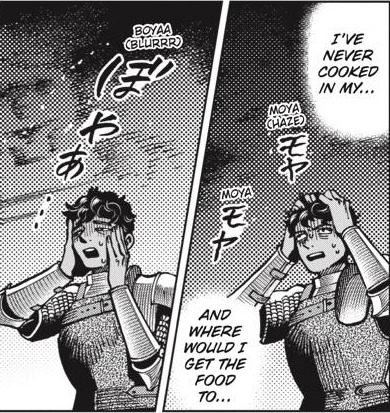

he talks about mithrun's story like there's no connection, like he's not literally looking at the dark mirror of himself. and, ironically, he chooses to not be vulnerable in front of the readers just like young mithrun wouldn't. extra materials give us a glimpse again: when in the main story mithrun said "i can't fall asleep without spell or potion", in the extra comic (literally behind the scenes) kabru says "i use alcohol to help me fall asleep". there's a connection and kabru sees it, but he's not telling it to us. (and yes. there's evidence that kabru is an early-stage alcoholic. we can see bottles under his bed and what he says basically imply that he depends on alcohol: he's not using it for recreational purposes, he's using it as a substance to make himself sleepy and, probably, less anxious. when that dependence turns uncontrolled, it often leads to full-blown alcoholism).
bigger connection to mithrun is of course kabru's refusal to accept his own humanity, to see that he's alive, that he has his own needs and desires. he's suicidal in the same way: he can only see his goal, he doesn't care about his life, he only sees the value of his life in relation to that goal and he never think what's gonna happen to him after he reaches this goal (because he unconsciously believes that "the after" wouldn't happen to him). and he doesn't reflect on it, again, until he's met with a question "what do you want to do?". the way he doesn't see himself as alive is omitted again in the big portion of the story and only really comes up in the end, when he asks "what was the point of my survival?", in a basically joking moment.
but we can see it through the symbolism, through his connection to death in the story, through his eagerness to sacrifice his life for the idealistic goal in his mind. and of course, we can see it clearly through his mirror: there's a strong parallel between kabru almost committing double suicide while chasing his goals and mithrun literally getting himself killed while chasing his own.
what i'm trying to say, it's interesting that kabru uses his control of the narrative to hide his own vulnerability from the readers. maybe mithrun sees himself as leftovers and it's something cathartic for him to admit in the end, but kabru really doesn't want you to see that he feels the same way. that he's also "leftovers". but you see, they are standing together in that panel. as kabru continues to try shielding himself from your view, kui puts the mirror next to him, revealing what's hidden.
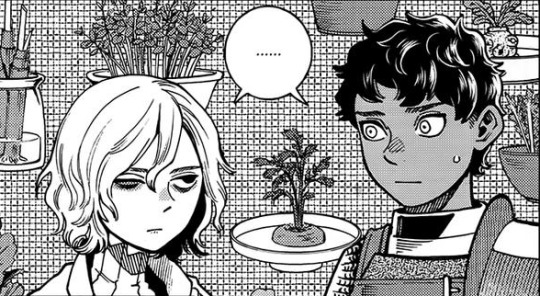
734 notes
·
View notes
Text
Kabru, impossible mutual understanding & unknowable objects
Despite his concerted and constant efforts to understand other people, it’s established in a few extras that Kabru believes that true mutual understanding between certain different races is impossible. Specifically, between long-lived and short-lived races, and between humans and demi-humans. Partially, we can trace this conviction back to specific hang-ups caused by his life; the trauma of the Utaya disaster, prejudices he carries from his childhood, and his experience of racism among the elves. In this “little” essay, I’m gonna discuss how I think those experiences formed this belief, how it comes out in his actions, and how some of his actions seem to contradict it. The question of whether it’s possible to reach mutual understanding with other living beings despite our differences is one of the core themes of the manga, and I’ll also touch on how this aspect of Kabru’s character links to that.
Seeking understanding
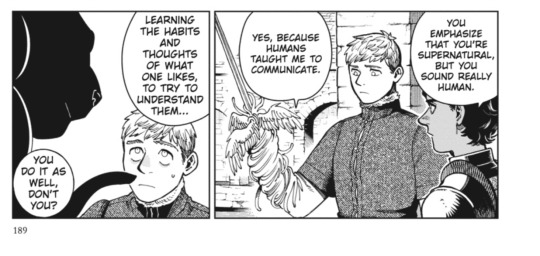
Kabru is a character who devotes a huge amount of time and effort to understanding people, and he is very good at it. In his internal monologue, we can tell how advanced and complex his skills of analysis are. He is able to read a huge amount of information just from looking at people's faces and body language.


People are, to him, what monsters are to Laios. This is something that's been expanded on at length in other, excellent meta. It's the fact that they're foils; it's the fact that Kabru is also very easy to read as autistic, with a special interest which is the opposite and parallel of Laios'. It's something that came out of trauma and alienation, as Laios' special interest in monsters also began as a coping mechanism.
The complicated origin of this "love" for monsters and for people comes through, I think, in the fact that one of the places we see both characters use their fixation is in being very, very good at killing the thing that they love. This also ties into the idea that loving something isn't even remotely mutually exclusive with using it to sustain your own survival; using it for your own purposes; hurting it or killing it. Love can be, and often is, violent, possessive and consumptive. This understanding is part of what makes Kui's depiction of interpersonal relationships so compelling to me.
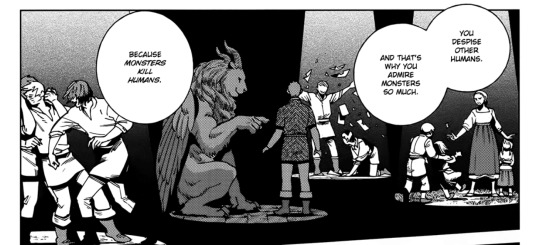
While Laios fixated on monsters and animals to seek a place of escape, in both his imagination and his self-image, from the humans who he couldn't understand and who couldn't understand him, Kabru seems to have fixated on understanding people in order to navigate the complex, socially marginal places that he has been forced into throughout his life. As an illegitimate child raised by a single mother with an appearance that marked him out as different to the point his father's family wanted to kill him, and a tallman child raised among elves who didn't treat him as fully human and wanted him to perform gratefulness for that treatment – treatment that, after he met Rin at age 9, he certainly always understood could be a lot worse – his ability to work out what people wanted from him, whether they were friendly or hostile or had ulterior motives, wasn’t just an interest. It will have been an essential skill.
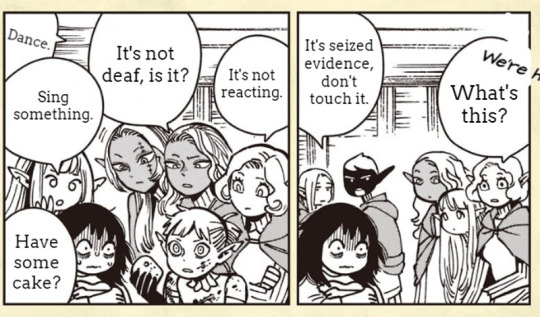
Milsiril, I think, was a flawed parent who tried to do her best by Kabru and did a lot of harm to him despite her best intentions. She may have treated him much better than an average elf would have, but like Otta and Marcille's mother, there are other elves with different outlooks on short-lived races. How would they judge her treatment of him? We don’t have any insight on what it could be, but to be honest, the person’s whose opinion of her I’d be most interested in knowing is Rin’s.
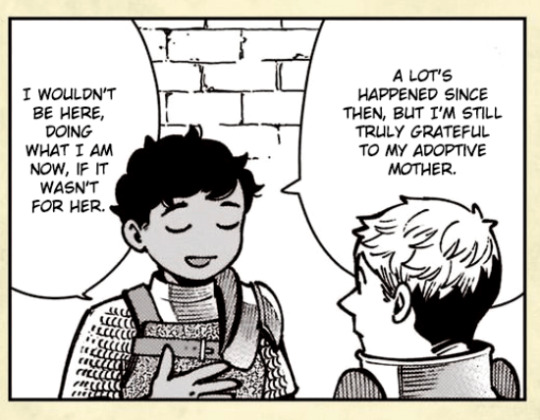
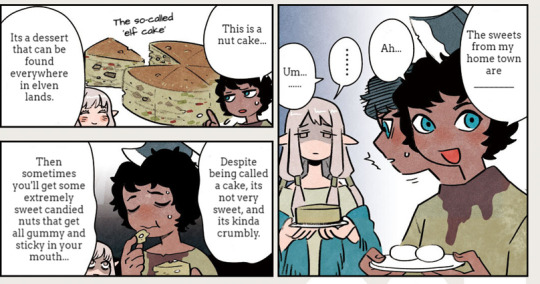
But even if she'd been perfect, living as an trans-racial adoptee in a deeply hierarchical nation with a queen who is a 'staunch traditionalist' who wouldn't even acknowledge the existence of a half-elf like Marcille (according to Cithis) is an experience that would deeply impact anyone.
Elves & Impossible mutual understanding
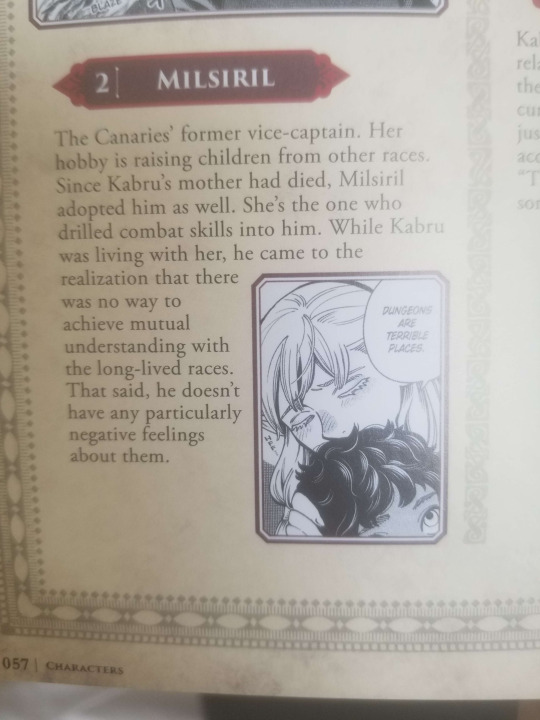
While Kabru was living with Milsiril - in other words, while living in the Northern Central Continent - he came to believe that "there was no way to achieve mutual understanding with the long-lived races."
This is evident in his political project: he wants short-lived races to have ownership over the dungeon's secrets. Despite his dislike of the Lord of the Island, he's a useful bulwark to stop the elves taking over. Despite his doubts about Laios, Laios needs to be the one to defeat the dungeon, because if he doesn't the elves will take over.
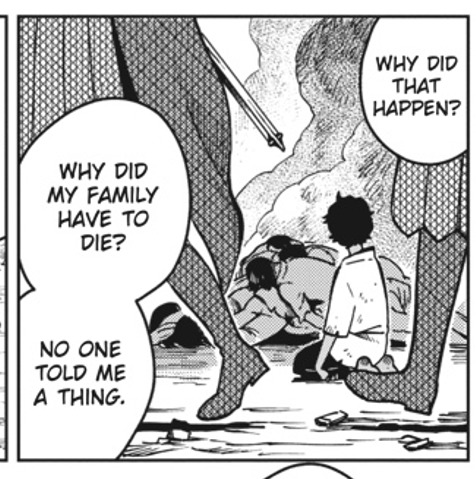
Kabru still carries a deep scar from Utaya, one that was exacerbated by the fact that he never got an answer to any of his questions about what happened or why. This, despite the fact that Milsiril knows about the demon and how it works. Do you think Kabru, with his social perceptiveness that borders on the superhuman, wasn't aware that she knew more than she would tell him?
Given that, the fact that he gets to a place where he "doesn't have any particularly negative feelings about [elves/long-lived species]" .... well, to put it bluntly, I believe that he thinks that's the case, but I kind of doubt it. After all, if he did have resentment, of Milsiril (someone who was his primary provider and caretaker since age six, and who despite her flaws, loves him and who I do think he loves) or of elves (who he has had to play nice with for most of his life, in order to survive, and will still have to play nice with in order to achieve his goals, since they hold all the power) what would that do except hurt him and make his life harder? Kabru is Mr. Pragmatic, so I don't think he'd let himself acknowledge any such feelings he did have. Exactly because he can't acknowledge them, they're well placed to get internalised as beliefs about the Fundamental Unchangeable Nature of the World.
However, these stated beliefs seem to contradict his actions. Despite his belief in the impossibility of forming a mutual understanding, he certainly seems to try to understand long-lived people, just as much as he does short-lived people. There's no noticeable difference between his treatment of Daya & Holm versus Mickbell & Rin that isn't clearly down to their relationship with him. His skills of human analysis were honed and developed while living amongst elves, and as soon as he's alone with Mithrun he immediately sets to understanding him - his interests, his motivations, his needs, and his past.
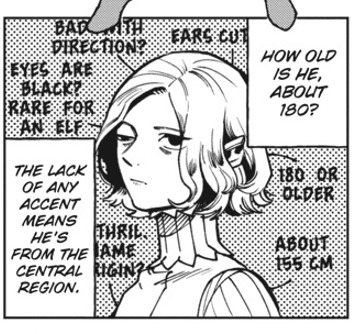
He treats him considerately and without bias, and despite the fact that Mithrun conquering the dungeon for the elves is both a reenactment of a core part of his childhood trauma and a political disaster for his aims, that doesn't seem to colour his perspective on Mithrun negatively at all.
This is something I find extremely laudable about Kabru, and it's another way he parallels Laios. He seems to understand that people, as a rule, (in Laios' case, he understands this about monsters - and eventually, all living beings) will act in their own interests, and if those interests conflict with yours, might harm you. But that's just their nature, and it's not something that should be held against them; you're also doing the same thing, after all. The crux of Laios' arc is precisely that he has to accept the responsibility of hurting someone else in order to achieve what he wants.
Kabru is deeply concerned with his own morals, what he should and shouldn't do, but mostly in the context of responsibility for the consequences - a responsibility he takes onto himself. He isn't scrupulous about what he needs to do in order to create the outcome he wants, but if he fails to create that outcome, then....
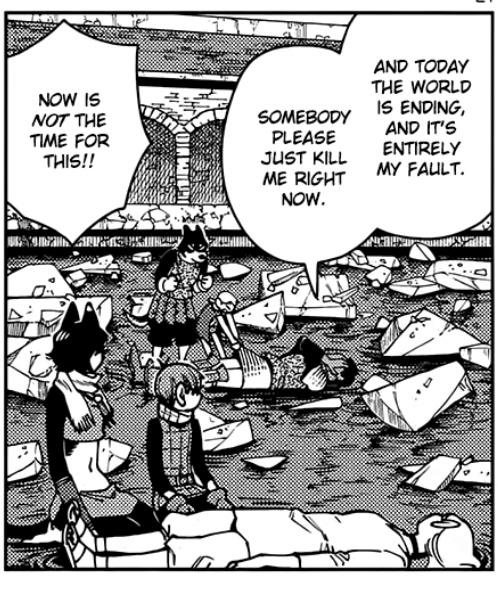
He blames himself to the point of thinking he should die. He doesn't blame Laios, or seem at all angry with him, despite concluding he should have killed him to prevent this outcome. That's because in his eyes, ultimately Laios was going to act according to his own nature, and it's Kabru's fault for not understanding that nature well enough. He's extremely confident in his ability to understand and predict others, (including elves and other long-lived people). Then, where does his conviction that mutual understanding is impossible come from?
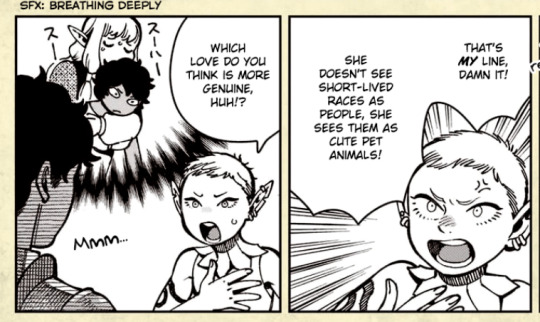
Partially, it's the "mutual" part. I'm sure Kabru, who isn't able or willing to deny Otta's insinuation that Milsiril saw him more like a pet than a son, has felt that his full interiority, the depth of his feelings and his ability to grow, act, and think as a fully equal being, was something that the elves around him just couldn't grasp. Because that was their excuse for it, he came to understand this as a gulf between short-lived and long-lived beings, an inevitable difference in outlook caused by their different lifespans.
This experience might be part of what leads to his iconic “fake” behaviour. He trusts his ability to understand others, but if they aren’t able to understand him, then there isn’t any benefit to being honest about his feelings and thoughts. If his attempts to reach mutual understanding with his caretakers were never able to be fulfilled, then it isn’t any wonder that he reacts with such surprise and horror at blurting out his desire to be Laios’ friend.
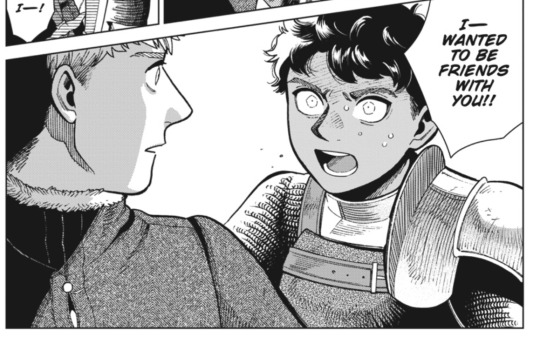
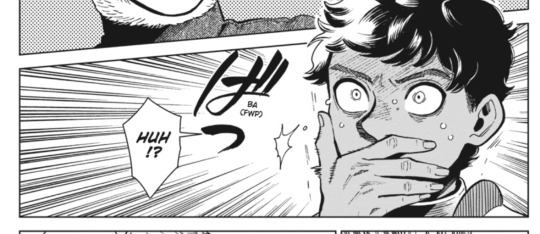
In his experience, making yourself vulnerable in that way only leads to being hurt. Soothing him, hushing him, lying to him, talking to him like a child that isn’t able to use proper judgement – that’s an inadequate and deeply hurtful way to respond to genuine distress, the desire for autonomy, or disagreement. Ultimately, I think that’s why he comes out on the side of being grateful to Milsiril; because she did equip him with the skills and knowledge he’d need to reach his goal, and let him go.
Though he could understand them, they couldn't understand him. To the extent that was true - which I'm sure it was - it wasn't due to anything about lifespan. It was due to the elves’ racism, and the solipsitic mindset & prejudiced attitude that it caused them to approach him with.
Because, if it needs to be said, the idea that there is an unbreachable gap in understanding between the long-lived and short-lived species is not true. Marcille and Laios have a much greater difference in lifespan than any full elf from any short-lived person, and they’re able to understand each other – maybe not perfectly, but better than many other people who are closer in life-span to them.
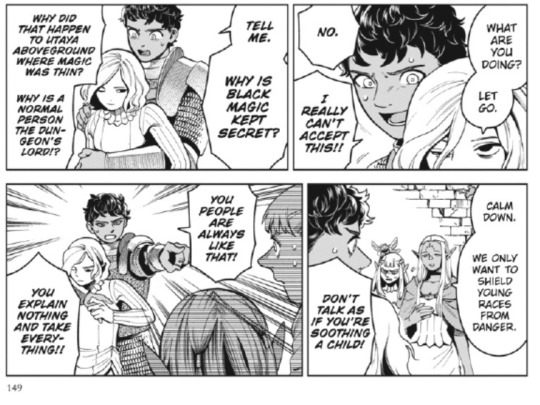
That doesn’t mean that I think Kabru is wrong about this, however. Because there’s an interpretation of his statement that is reflected in his actions and is true. When he talks about his problem with elves, it’s not just their attitudes: it’s their power, and what they use it to do. They “explain nothing and take everything”. Though it’s presented in the guise of ‘guiding and protecting’, in fact it’s a simple case of a powerful nation using their military power, wealth, access to resources, and historically stolen land – including the island itself – to protect their own interests and advance their own agenda. That’s why they’d be able to show up, seize the dungeon, and forcibly take Kabru’s party and Laios’ party to the West. If Kabru wants to stop that from happening, or change that status quo, persuasion or a bid to be understood would be completely pointless. Between the political blocs formed by long-lived species and the interests of short-lived species, “mutual understanding”, given their current, unequal terms, would be impossible. This is something that we see reflected in Kabru’s actions; before he asks his questions about the dungeon, he grabs Mithrun as leverage. He never really attempts to persuade the canaries to see his point of view, because that would be pointless: they’re agents of the Northern Central Continent’s monarchy, and will act in its interests regardless of any individual relationship with him.
I don’t think Kabru sees the different dimensions of this belief of his in quite such clear terms, however, as is evidenced by the other group who he thinks it’s impossible to communicate with.
Demi-Humans & Unknowable Objects
The other place that we see his conviction about the impossibility of mutual understanding is in the kobold extra.
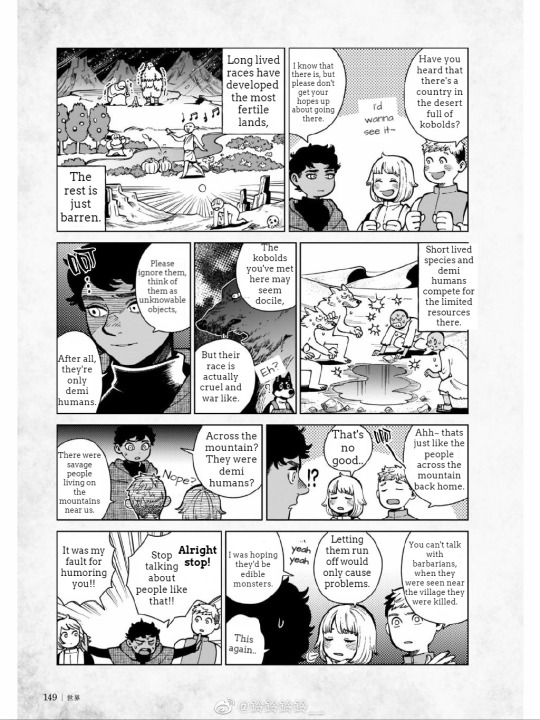
I'm including the whole thing, because I think it's an excellent and clever piece of world-building. Aside from what it says about Kabru, which I'll expand on shortly, what this extra does is deconstruct and call into question the usual "fantasy ontological biology" present in these sort of DnD-like settings. Essentially, the kind of worldbuilding where a race (such as kobolds) can be described as war-like, and that's establishing something essential about their biological nature. That's common to the point that if Kui didn't include this, some people would probably come away thinking that's the case about, e.g., the orcs.
But here, despite what Kabru is saying, the information the reader actually gets is:
the conflict between short-lived humans and demi-humans such as kobolds is mostly over access to material resources that they need to survive.
These resources are scarce because powerful nations, such as the elves, have monopolised them.
Kabru, who has grown up in a place at the centre of these conflicts, ascribes essential, negative traits to a cultural group which was in direct conflict with his own. Communication with this other group is impossible; they aren't people, they're more like objects.
oh yes! just like this conflict between groups of tall-men, a conflict which the reader will immediately interpret as more clearly analogous to real-life racism. Our other protagonists also carry prejudices from growing up in a place where a marginalised group was in conflict with the dominant group over scarce resources. It's definitely impossible to communicate with these people, and you can only kill them.
Woah, when you say it like that, it sounds pretty bad!
But also, nobody walks away having had a realisation or unlearned their prejudices - because they don't have the tools they need to do that work. Yet. I do think, to an extent, it could happen - especially with Kabru, since it's suggested in the epilogue that Melini might become a safe-haven for demi-humans.

To focus in on Kabru, the key here is his statement that you should think of demi-humans as "unknowable objects". Even his extraordinary powers of understanding have seemingly hit a limit. Part of this is just inherited prejudice, and doesn't need to have a complicated psychological explanation, any more than the elves who were prejudiced against him need one.
But also... this is probably somewhat linked to the way demi-humans seem to be considered "pseudo-monsters". They're the place that the strict delineation between the human and the monstrous is permeated. Laios, who is not interested in humans, remembers and is excited by Kuro. Chilchuck and Laios argue over whether it's OK to eat a mermaid. Kabru's prepared to (pretend to) roll with the idea that Laios ate the orcs.
But these are people, aren't they? Of course, this is a social construction, as we see from the fact that in the Eastern Archipelago, the label of "human" is reserved for tallmen, but in most of the rest of the world it depends on some obviously arbirary classification based on number of bones; "demi-humans" aren't in any essential way monstrous, except to an extent in their appearance, and physical location - due to their marginal social status, they're pushed out to live in unsafe places such as dungeons.
Therefore, Kabru's view of demi-humans as fundamentally "other", unable to be understood - monstrous - could be read as akin to abjection, the psychoanalytical concept described by Julia Kristeva. In order to create a bounded, secure superego, that thing which permeates and calls into question the border between self and other, human and animal, life and death, is rejected and pushed to the margin.
“Not me. Not that. But not nothing, either. A "something" that I do not recognize as a thing.[...] On the edge of nonexistence and hallucination, of a reality that, if I acknowledge it, annihilates me. There, abject and abjection are my safeguards. The primers of my culture.” (Kristeva et al., 1984, p. 11) “It is thus not lack of cleanliness or health that causes abjection but what disturbs identity, system, order. ” (Kristeva et al., 1984, p. 13) “The pure will be that which conforms to an established taxonomy; the impure, that which unsettles it, establishes intermixture and disorder. [...] the impure will be those that do not confine themselves to one element but point to admixture and confusion.” (Kristeva et al., 1984, p. 107) (discussing food prohibitions in Leviticus)
This is both (due to its affinity with food-loathing and disgust) a very fruitful concept to apply to dunmeshi, and a psychoanalytical theory which I wouldn't exactly cosign as True Facts About Human Psychological Development. You may also know the abject from its utilisation in the classic essay "Horror and the Monstrous-Feminine" by Barbara Creed - that's a lot more approachable than Kristeva if anyone's interested.
Key here, though, is that through the symbol of the "demi-human" is embodied a step between "human" and "monster" - and that's a prospect that puts at risk the whole notion of an absolute separation between those two categories in the first place. To Laios, that's something wonderful, and to Kabru, it's terrifying. We can see this principle further embodied in the relationship both characters have with the notion of becoming monstrous.
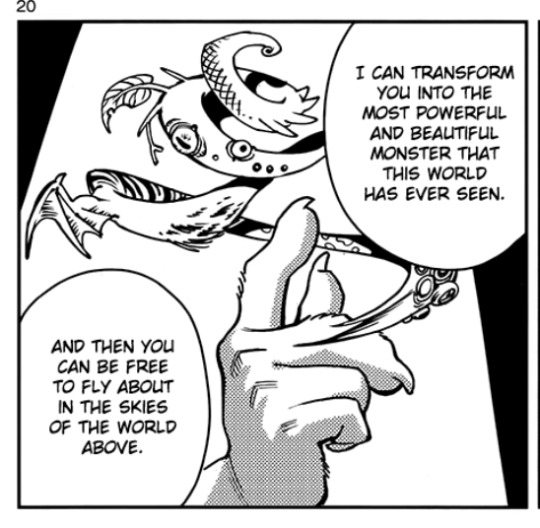
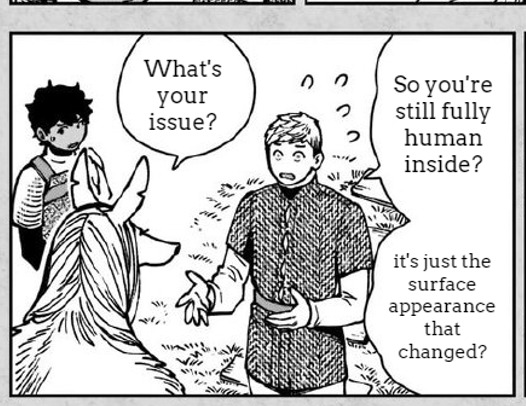
To Laios, this is transcendent, and represents a renunciation of everything human - in fact, if it didn't, it wouldn't "count".
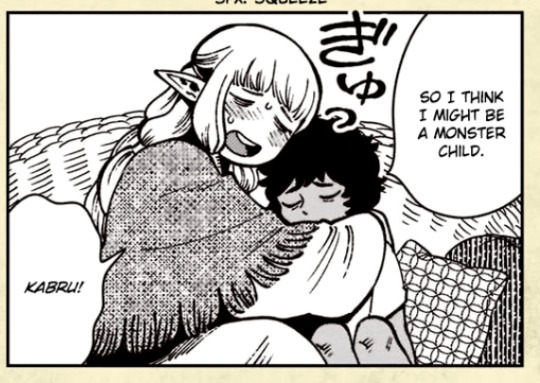
To Kabru, it's a deeply-held fear, established by his childhood alienation (due to his illegitimacy, his eyes, and perhaps also his neurodivergency), deepened by monster-related trauma and the sense of responsibility and survivors guilt he feels for what happened at Utaya. His identity as a human who is not monstrous is key to his sense of stability and safety; he doesn't want to touch monsters, he doesn't even want to see them.
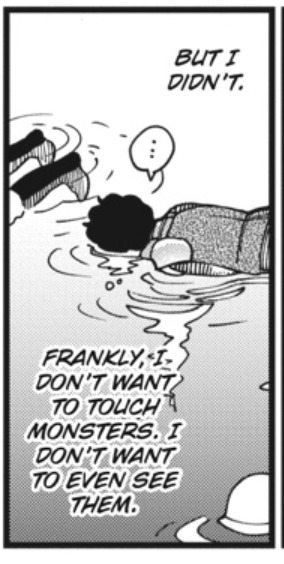
To acknowledge a kinship, a possibility of similarity between the things he loves (humans) and the things he hates (monsters) would be more than touching them - it would be putting them inside him. We know, quite explicitly, that this notion is triggering to Kabru. He literally has what seems to be a flashback when he's about to eat the harpy omelette.
So he abjects it, classifying the demi-human as fundamentally unlike him - an unknowable object, or an object that he refuses to know. Because in understanding it, he would interject the things he hates and fears into his self, which is already, always under threat by that hated and feared object.
Of course, again, Kabru isn't very good at enacting this refusal in practice. For one, when he chooses between his desires and ingesting the feared object, eating monsters... he eats monsters. Part of this is treating himself badly, the "ends justify the means" mentality. His goal is to destroy all monsters, so if he needs to become monster-like to do that, he will. But part of it is also the other motivation that he didn't even seem to know about until he said it: he wants to become Laios' friend, and to learn from him how a person can like monsters. He wants, at least in some part of him, to reconcile the feared and hated object into something he can understand.
For another:
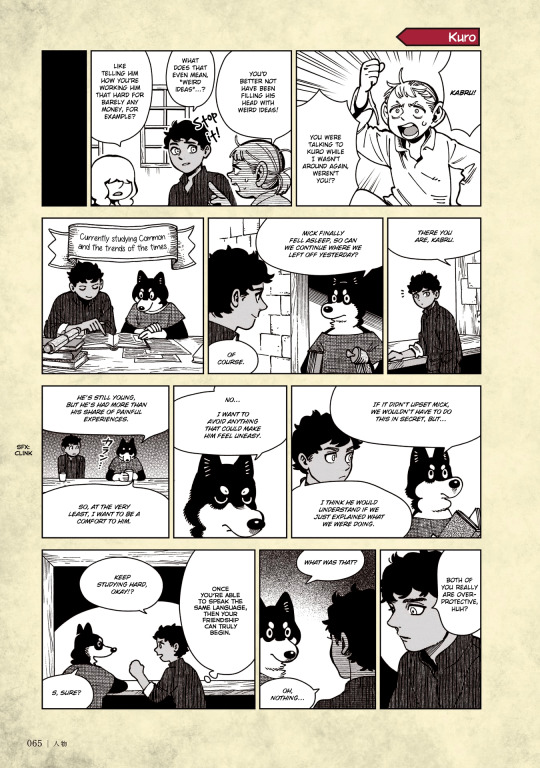
Kabru can speak the kobold language. In the first place, while this may have been common in Utaya, it also could have been something he chose to learn, an early expression of his interest in understanding and talking to all sorts of people. It isn't the kind of thing you learn if you believe that communication between yourself and the group that speak it is impossible, is it?
It's possible to harbour prejudices against a group while being kind to an individual, and given Kabru has those prejudices regardless of his reasons, that is what he is doing. But also, his treatment of Kuro doesn't reflect a sincerely held belief that he's an "unknowable object" at all. His approach is exactly the same as it is to any other person: an analysis of goal and motive, and an attempt to help if he's sympathetic and their goals align - going out of his way to give language and local knowledge lessons in secret. His conviction that Mickbell and Kuro will truly become friends when they can properly communicate is completely contradictory to any sense of demi-humans as fundamentally different, or impossible to reach mutual understanding with. To me, it seems like this self-protective shield against the corruptive force demi-humans as an idea present to his identity, this abjection, when Kabru is face-to-face with one, just simply can't hold up against his finely honed skill of intellectual empathy. Perhaps because he's autistic, it seems his "empathy" is less an emotional mirror response, and more a set of cognitive skills for analysis of others. That instinctual, emotional empathy might not trigger when presented with a member of an out-group, but if it’s possible for Kabru to turn his cognitive empathy off, we don’t see him do it.
This isn't to say that this prejudice doesn't affect his behaviour. For one, it could negatively impact his judgement of politics and policy, where individual people don't enter into it. For another, I'm not convinced he'd be willing to overlook Mickbell's exploitative relationship with Kuro if Kuro wasn't a kobold. As it is, since both of them are satisfied, he doesn't feel like he needs to intervene, regardless of the fact Mickbell isn't paying Kuro. But if Daya and Holm were in a relationship, and Holm took both Daya's and his own share from their ventures, but only compensated her in living expenses and kept the rest, do you think he'd tolerate it, for example? Even if she said it was OK?
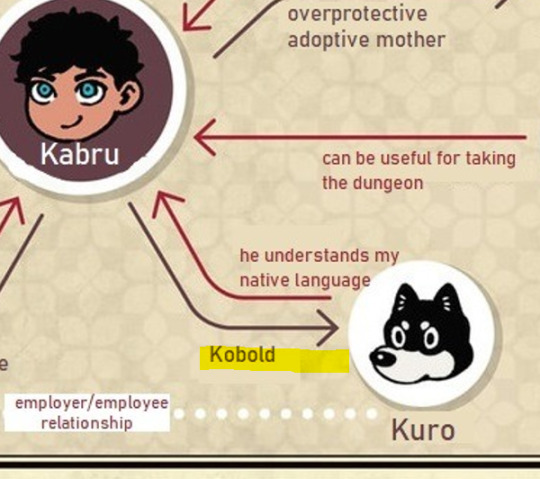
Conclusion

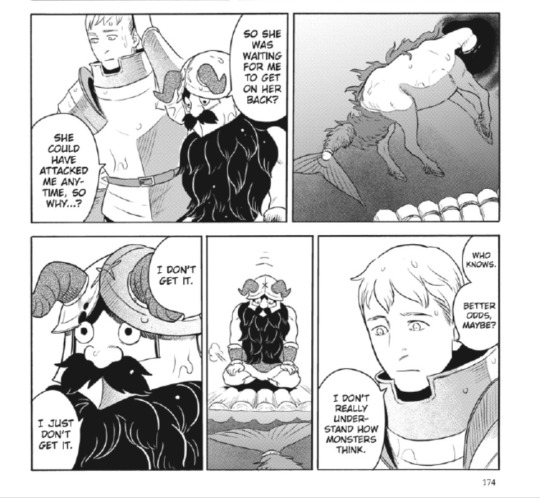
The kelpie chapter establishes that "people can never know what monsters are really thinking." That isn't just true of monsters, though.
True mutual understanding is impossible - between anyone. We can never truly understand another person's heart. This is touched on in, for example, the existence of shapeshifters and dopplegangers. Even a monster that seemed like a perfect copy of a person wouldn’t be that person, and wouldn’t be a satisfactory replacement.
We’re intended, I think, to understand the winged lion's repeated suggestions to just replace people who have been lost with copies as something uncanny, which demonstrates the way that the winged lion never manages to attain a complete understanding of humans. A version of a person who was created to fulfil your memories of them, to be the person who you wanted them to be, would be a terrible, miserable thing.
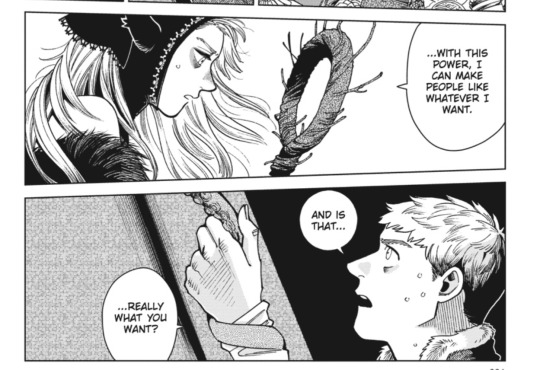
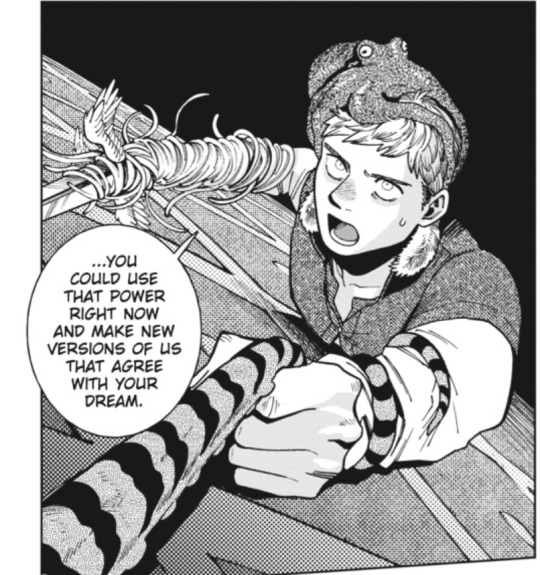

Disagreeing, coming into conflict, and misunderstanding each other, are essential parts of what it means to be living beings, as fundamental as the need to eat.
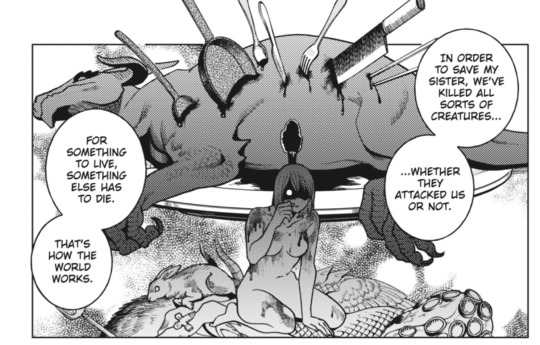
The only thing to do is not to take more than you need to eat to survive, and not impose your own desires onto others. To do your best to sincerely communicate your desires, even if they're embarrassing or vulnerable or strange, like Kabru eventually does with Laios; like Laios does, bit by bit, with the people around him; like Marcille does, Chilchuck does, Senshi does... to hope they will accept you, and do your best to understand them in return.
We can re-examine, in that context, Kabru's line about the elves' tendency to "explain nothing and take everything".
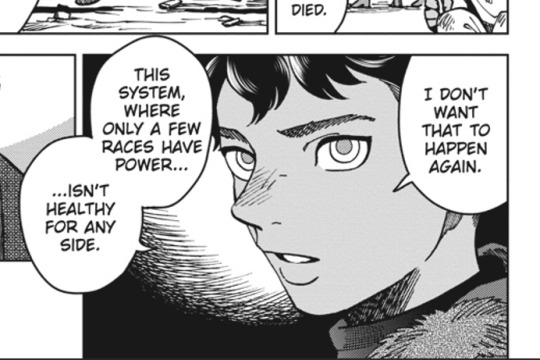
They have the power to impose their preferred "menu" onto less powerful groups. And in that context, mutual understanding being impossible just means that they won't give up their power because they're asked nicely. Kabru's goal is to seize the truth that they won't give to him, and to create a situation where they can't take everything. Because he's accurately surmised that nothing about the treatment of short-lived races will change so long as the power imbalance remains. Despite the way he mistakenly ascribes part of that to "long-lived vs short-lived" or "human vs demi-human", the actual gulfs in understanding he identifies are structural, are about power and about access to material resources and safety.
I think he could come to recognise this. Yaad is teaching him political science after all, and while a prince's lessons on political science won't exactly get at much that's radical or invested in the interests and perspectives of the marginalised (Capital is a critique of for a reason after all...) I believe in Kabru's ability to learn critically and get more from a lesson than it was intended to teach.
#og post#kabru of utaya#kabru dungeon meshi#laios touden#dungeon meshi meta#dungeon meshi#dunmeshi#dungeon meshi manga spoilers#dungeon meshi analysis#kuro dungeon meshi#the canaries#milsiril#continuing to develop my kabru theses.#literally sitting and thinking about kabru all day. rotating him.#he's in the microwave. to me.
2K notes
·
View notes
Text
Thinking about the way dungeon meshi does queer horror. Using horror to tell queer stories is already subversive, but dungeon meshi subverts it even more
Normal queer horror is like. A monsterous desire and immortal love of something isolated/hated and the uncontrollable but suppressed need to consume someone to live and they only die if you break/pierce their heart. its great.
In dungeon meshi, the group is STARVING. they do things the way they're expected to and they're so deprived that eventually, one of them is consumed by that monsterous desire.
Then when Falin becomes a monster, she doesn't eat Marcille because she doesn't NEED to, Marcille already offered herself up as part of Falin by mixing her own blood with the dragon's for the resurrection.

Also Marcille is a monster too!! She doesn't need to be turned by Falin. She's a 'witch' doing black magic for one but she's also very vampiric
Her name is super vampirey especially given one of the translation spellings was Marcilla, an annogram of Carmilla*. And Marcille is very similar to Marceline from Adventure Time so it's a name with heavy connotations to me. Also her staff is Ambrosia which means immortal.
*ps Carmilla is the original modern vampire that inspired Dracula and also a lesbian. she used annagrams of her name (Marcilla, Mircalla, Millarca) to disguise herself across hundreds of years.
Marcille is like. a vampire in that death is a big part of her theme. She can breathe that immortality into someone else using her resurrection black magic and death is a huge part of her character. She wants them to live as long as she does. To make them immortal. Like. Like a vampire. Vampires which are unholy when her love interest is a cleric.
But once again this is subverted!! she doesn't 'turn' Falin, she makes her undead by giving her own blood instead of taking Falin's. Falin becomes a monster not because she's attacked or turned, but because her DNA, something INHERENT about her is now intertwined with the monster. so a god-like figure merges them. Then the only way to free her from that frenzy and grant her autonomy again is to finally consume her. something inherently lesbian about all that i think idk about you
#grain of salt#im anime only so I don’t know if the eating her solution works#but whatever happens I BET it’ll work with this queer horror metaphor#dungeon meshi#delicious in dungeon#dungeon meshi analysis#farcille#falin touden#marcille donato#queer horror#lesbian vampires make me crazy#i have sooo much to say abuot the queer horror of this show#genuinely how does anyone say theres no romance or theyre not gay because. yeah its only implied but#if you have to make them kiss to prove theyre in love then theyre not really in love#you should be able to tell from implication and interaction and you DEFINITELY can with the way they talk about each other#'marcille.... her name is marcille' with that little smile. thats a girl in love#my posts
478 notes
·
View notes
Text
Ok, I have some thoughts on the ending of dungeon meshi that I'd like to share, so major spoiler warnings ahead for the end of the manga.
Specifically, I have some thoughts on the Winged Lion's curse, and that I actually don't think it is a curse - at least not a literal, intentional, "I am cursing you" type curse. I don't think the Winged Lion came up with a customized ironic curse for Laios specifically, and cursed him as its final act before disappearing.
Consider the two components of the curse as it is generally discussed in the fandom. The first is that Laios always feels hungry/never feels full or totally satisfied, and the second is that monsters are afraid of him and avoid him. I'll start with the first part.
When we see the backstory of the Winged Lion/the Demon, we learn that it essentially gained consciousness by discovering desire/hunger and developing an appetite. This happened because it ate the desires of other creatures, first small ones like bugs, and eventually worked its way up to humans. Once this appetite exists, it only grows and requires more and more to feel sated but the satisfaction never lasts long. We see that the Winged Lion is disappointed after finally eating Thistle's desires (which are particularly complex and have been marinating for a thousand years) and then is hungry again pretty much immediately.
I think, when Laios ate the Demon's desires, he became the only other conscious being to have consumed desires and therefore developed the same appetite for them that the Demon had developed millennia ago. Laios even says while he is eating it that the craving for more could drive you to do just about anything. When Laios turns human again, the appetite remains, but he no longer has the physiology to be able to consume desires. (Remember that the ability to do so was something he specifically stipulated in his description of the perfect monster). Therefore he has an insatiable appetite for something that he physically can't consume, and this manifests as a constant feeling of hunger. It's not something the Winged Lion chose to do to him, it's just what happens when a conscious being eats desires - they always want more, forever.
This is so tragic and poetic to me because in doing this, Laios dooms himself to a lifetime of discomfort, but saves the rest of humanity and also saves the Winged Lion in a way. The world is a much safer place if a hunger like that is felt by a mortal human who can't act on it, than by an immortal eldritch god-being with immense power. And the Demon can go back to being a chill elemental force rather than a conscious being that's always insatiably hungry.
Moving on to the next part of the curse: Monsters being afraid of Laios and avoiding him. The first thing to note about this is that it's only very briefly mentioned in the epilogue, and Laios apparently thought that this is what the curse was, but we don't have much to go off of. From the information we do get, though, there's another explanation that makes sense to me. Consider all of the information about monster behavior that we learn from the very beginning of the story. The rules are straightforward, it's eat or be eaten, and monsters are just animals at the end of the day. They are trying to survive, and they will avoid a bigger, stronger monster. That's what keeps the ecosystem of the Dungeon in check. I think the monsters are just continuing to interpret Laios as the biggest, strongest monster, since that's what he was at one point and he still wears its skin. It isn't something the Winged Lion did to him on purpose as a final curse - it was a natural consequence of Laios's choice to become the strongest monster, that other monsters would avoid him.
Finally, you might be asking, if there is no intentional curse then what did the Winged Lion mean when he told Laios his greatest wish will never come true now? We know that Laios thinks this means Falin won't be revived, but obviously they do successfully save her, and the Winged Lion actually sort of helps her to be saved, by telling her which way to go after she consumes the dragon.
I think the Winged Lion thinks that Laios's greatest desire is to live as a monster, something that is only possible through the power that comes with being the Dungeon Lord. It's a straightforward logic: no more Demon means no more Dungeon Lords, which means Laios can't have his perfect monster body anymore. I really think it's as simple as that.
In conclusion: When the Winged Lion says "I curse you, now your greatest wish will never come true," I don't think this is like a magical witch's curse, he's just pissed off and is basically saying "Fuck you dude, getting rid of me means you can't live out your fantasy, why did you do that." The other two lasting negative things that Laios experiences are just natural consequences of the things he did.
I've been mulling this over for the past few weeks since finishing the manga and really wanted to share, so if you read all this, thank you and please let me know what you think!
#yapping#dunmeshi#dungeon meshi#dunmeshi analysis#dungeon meshi analysis#laios#laios touden#winged lion#dungeon meshi spoilers#dunmeshi spoilers#dungeon meshi manga
128 notes
·
View notes
Text
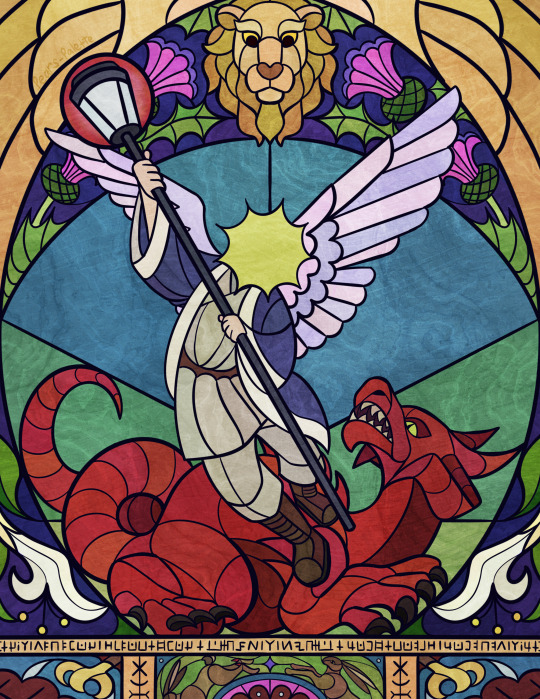
"Mural of the Martyr"
[ID in Alt]
I am so proud of this piece! I need to talk about my inspiration and symbolism (Warning: some manga spoilers ahead)
Several people have pointed out that Falin is often put on a pedestal, especially by Laios, Marcille, and Toshiro. The way they see her is almost saint-like; as if she could never do no wrong. This comes from a place of love, but it still puts pressure and unrealistic expectations on Falin. Due to the religious connotations, I styled this after murals of Saint Michael the Archangel.
Someone (I can't remember who, so if you know, lmk) pointed out that almost all the fan art of Falin focuses on her relationship with others or the emotions she inspires in others. For the most part, she is shown by herself in fan works only when she's a chimera. Which, I fully understand, Chimera Falin is cool as hell. But it is also the state where she lacks the most agency- literally changed into something else and under someone's control. That's why I wanted to do a piece that had her front and center, yet still lacking a face.
There's also the more minor symbolism; The winged lion looking down upon her, with wings framing the scene, the thistle- even if the transformation was unwilling, you could tell Falin still cared for Thistle. The honeysuckle ties into her memories of youth and her attempts to keep herself from starving. There is the claws of the griffin ready to tear into flesh, added because of how it was initially mistaken for Falin, and the themes of "eating something to honor them" + cannibalism, The middle being the rabbit stew that was such a trial of dedication to obtain and Falin's comfort yet downfall. The runes in the golden borders at the bottom are the same runes used in Marcille's resurrection spell for Falin.
If you've read this far, thank you! I love Dungeon Meshi and enjoy incorporating layered meanings into my art.
#falin dungeon meshi#falin dunmeshi#falin touden#dungeon meshi#dungeon meshi manga spoilers#delicious in dungeon#dunmeshi#dungeon meshi analysis#the red dragon#id in alt text#my art#stained glass
395 notes
·
View notes
Text
Is Chilchuck's wife blonde? Analysis:
I've noticed a lot of the fandom doubts what Chilchuck's wife looks like and still thinks she's a blonde woman. Which is understandable, since it seems to be something Kui really likes to point out. But my theory is it's intentional, and more important than we think.
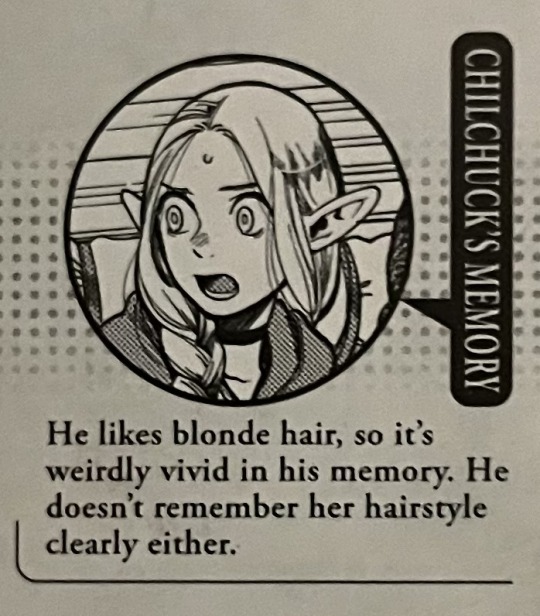

As I said, be clearly has a type for blonde woman. And Kui makes a point of this by continuing point it out in the World Guide side book. But why? It hardly seems relevant, after all it's only mentioned once in the manga during chapter 58.
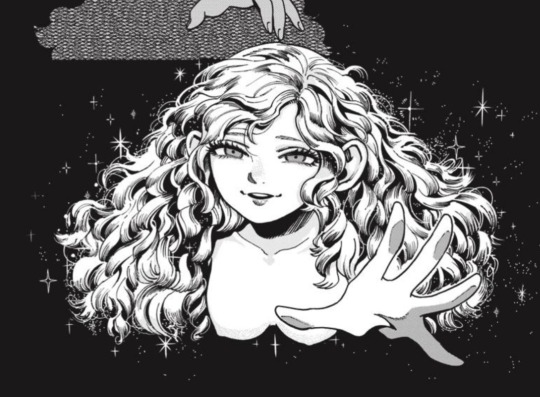
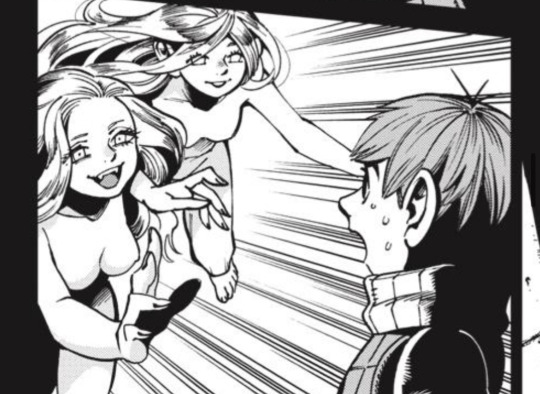
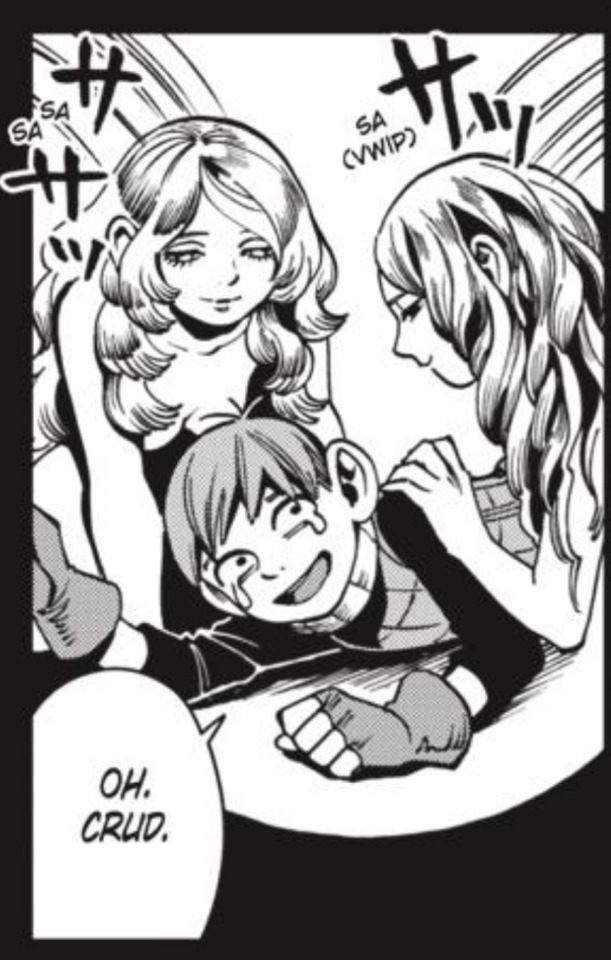
Many fans assumed the first woman that succubus took the form of was his wife. Which is understandable. But that gets quickly thrown out the window when the next serval succubus that attack him all look completely different. But according to Marcille, they're all blonde. And she even asks if that was because of his wife. Which is why many people probably think she's blonde.
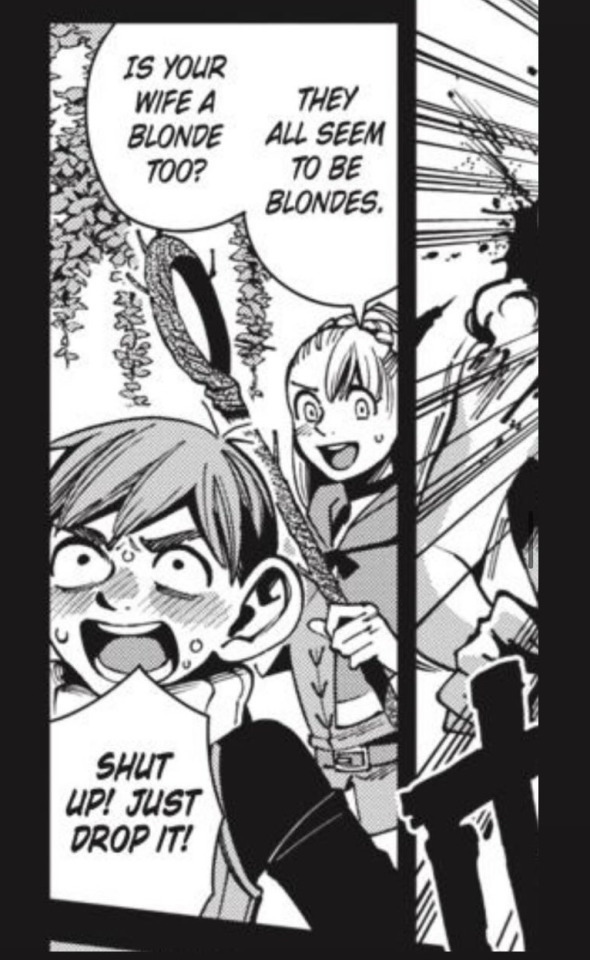
But Chilchuck gets upset when she asks. Now at first you assume it's just Chilchuck being embarrassed as always. But at this point he's talked about his family multiple times calmly. Especially after having such a serious talk about his wife just a few chapters earlier, why would he react so strongly again now?
Now let's put that aside for a second. Why does the fandom believe the woman with short black hair is his wife? Well simply because she shares multiple features with his daughters, who we actually do see and confirmed to be his daughters.
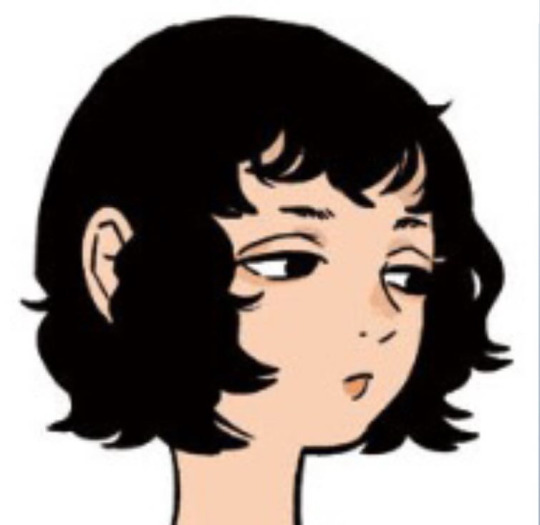
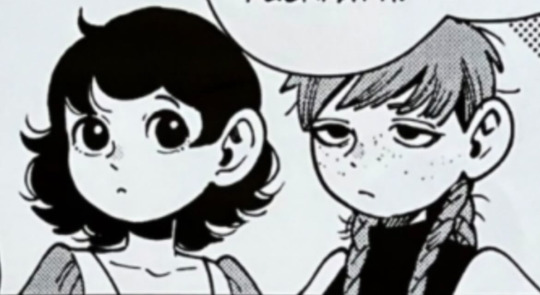
His oldest, Meijack, shares her more unique eye shape. And his middle, Flertom, her hair. They even have the same small piece of stray hair on the top of their heads. So it's highly unlikely this is a coincidence.
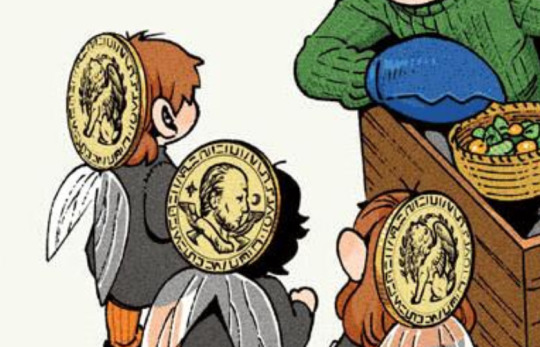
And according to this official colored sketch, neither of his children are blonde. So it's safe to assume his wife is in fact, not blonde. So then why is it talked about so much?
Well actually I think his "fetish" to say, along with the succubus is what drove his wife to leave him.
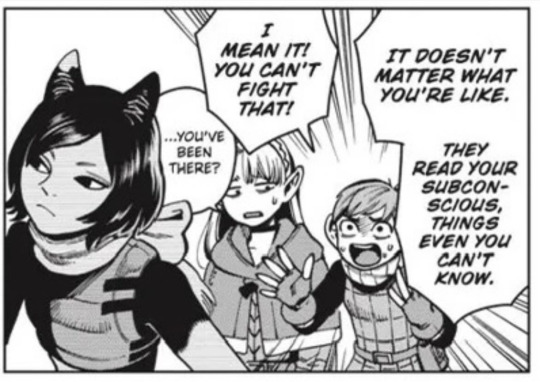
So before they encounter the succubus, Chilchuck freaks out when he realizes what attacks them. Which isn't out of character for him, but he's very specific with what he said. It's clear he really, REALLY doesn't like the succubus. Even Marcille comments about how it seems he's seen one before.
Now we do know due to a side comic that a party tried to feed him to a succubi group. Which could explain why he's so scared, but he never actually sees any of them. He runs away before they even find them. (I'd provide evidence but I've reached my limit on photos and I don't feel like making multiple posts lol.)
So why does he know so much about how they work then?
Here's my theory:
He actually DID run into a group of succubus a long time ago with another party. The same party that actually knew and ended up meeting his wife. Blonde woman like we saw attacked him, and the party already knowing about his wife assumed; oh! That must be what if wife looks like of course! Eventually down the road the party meet her. Only to be surprised that she looked absolutely nothing like his fantasy they saw. So of course through drunken fun, the party brings this up. More to make fun of him if anything. I'd assume him and his wife were already having problems up to this point. Maybe she had doubts of him being disloyal since he was always away. Or maybe doubts that he didn't loved her anymore, or even no longer found her attractive or desirable still. So hearing that a creature that supposedly transformed into the thing your heart wants the most, and it's the complete opposite of her confirmed whatever insecurity she had in her mind. That maybe the woman they turned into was even his mistress herself?! Knowing Chilchuck, he probably didn't try to comfort her or at least did it very well. Or maybe not even try to talk about it after at all and instead just tried to blow it off. Which only made things worse. And that pushed her to finally leave. Her final straw possibly.
However this is purely speculation of course. A theory based on the extremely limited knowledge we have of that night and their marriage in general.
#chilchuck#chilchack#chilchuck's wife#chilchuk dungeon meshi#delicious in dungeon#dungeon meshi#chilchuck tims#dunmeshi#meijack#flertom#dungeon meshi analysis
235 notes
·
View notes
Text
//DUNGEON MESHI SPOILERS, chapter 71


this scene!! it makes me very surprised that i havent seen it talked about yet, backpack thistle is so fun but what about laios sharing facts to thistle???
i think the fact that thistles way of thinking and decision making is similar to the one of a child is such an important part of his character and this scene just shows that off so well, he really just wanted to be able to be with everyone and have all of them be happy and healthy so he tried his very best to do exactly that,
deciding to just seal everyone up is, like i said, a solution that shows off his childishness, if you dont leave the dungeon you wont be harmed, so why not just close the exit?
in this scene it still shows that, he still just thinks that way and is interested in what laios is sharing because, well, interesting facts, but also its useful information to better the dungeon


i really love how laios chose to reason with thistle and explain how his actions are causing pain to the ones hes trying to protect and this isnt exactly resulting in what he hoped for but instead just making everyone miserable and thistle takes the time to understand and think of another solution



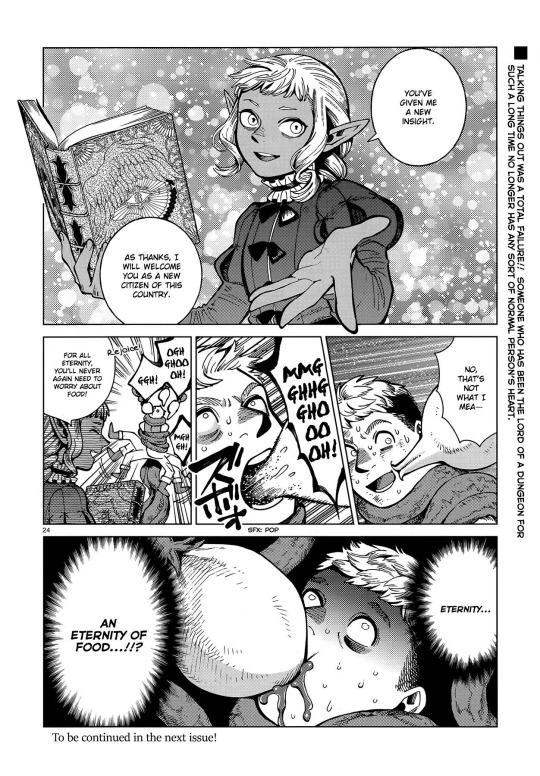
buuut,, well, doesnt go as planned, but again this just even further shows that thistle just very much has the mindset similar to one of a childs, taking the most direct and somewhat rash approach for a solution,

this is all over the place but i really just wanted to share this scene since it stood out a lot to me and is so far my favorite; ive seen a lot of people dislike him for his actions but really i just think that with his childishness (or rather age? he would be older than marcille but to me very much acts like a teenager at the oldest,,) combined with his desire and the whole situation,, i really just,, aahhhhh, i really like thistles character

#char speaking#dungeon meshi spoilers#dungeon meshi analysis#dungeon meshi#delicious in dungeon#thistle#laios touden#a bit ago i posted saying i think thistle is going to be a favorite. well. i was right sigh
195 notes
·
View notes
Text
I've been reading Dungeon Meshi and the cover for chapter 52 really stood out to me:
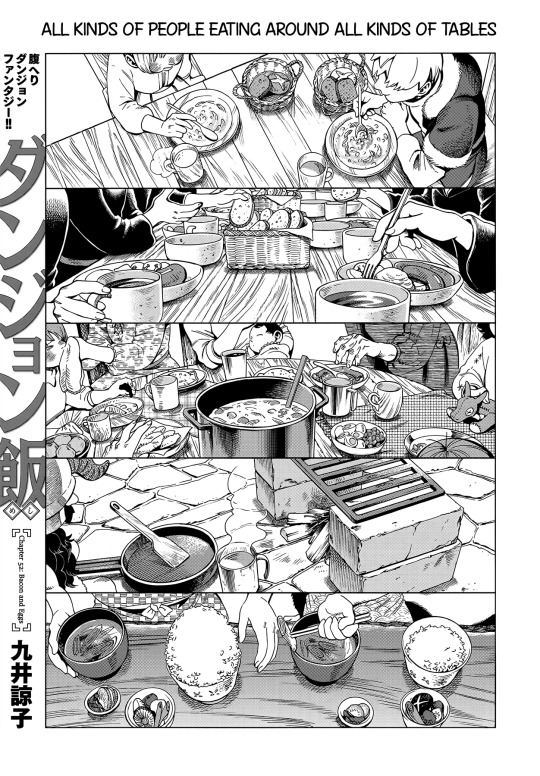
I think this cover so perfectly demonstrates the core themes that have been set up throughout the series thus far and also represents the characters really interestingly. Specifically the differences in their upbringings through the act of eating.
(Analysis under the cut ^_^)
First off, Laios and Falin are eating alone because they left home early in life and only have had eachother. They've had other party members but they've never enjoyed the toudens company like the two think they do, especially Laios. The two are alone because often times their party members don't actually care for them or see them as friends.
Marcille is eating in a cafeteria at her magic school, the composition is symmetrical to show the rigid lifestyle of the school and show how routine it is. It was a core time in marcilles life because she was happy and because it was structured. Often times, structure is the most comfortable thing someone can have, even if it is ultimately fleeting. School will end eventually and most of the connections you make are temporary but still effect us.
Chilchuck is eating with his family, showing the importance of his family to him. I really like this one in particular because even if his family is important to him, he'll always keep them at an arms length. His face is the only one shown, showing this about him. His face is also being cleaned by another person, showing the need for vulnerability and letting your gaurd down around people you care for, but also how Chilchuck is unwilling to do that.
Senshi is eating alone, he doesn't have a table either, showing how he lived in the dungeon for a long time and how he didn't have anyone to feed or care for even if it was something he deeply longed for. He's alone because he doesn't have anyone that could be there for him anymore, no family, no friends. I'm crying actually.
Finally, with Izutsumi she's eating with another person. Her table maners are poor, she can't hold chop sticks correctly and she's giving away the food she doesn't enjoy. We've seen this about her countless times but it's really amplified by this because it shows that she's always been like this, it's ingrained in her behaviour because no one either cared enough to try to teach her to be polite or never properly made an effort to. I'm sure Maizuru would try to fix her maners, but wouldn't do it in a thoughtful caring way that'd be actually helpful for izutsumi. She'd probably try to "whip her into shape" rather than treat her with compassion and patience.
All of these really accurately show how important connections are, how you need people. You need someone that will never treat you poorly, someone that will stick with you through thick and thin because they genuinely love you. You need the simplicity of routine, you need people that gravitate in and out of your life, those connections are important and often temporary but mean the most in the time you knew them. You need family, people you can let your gaurd down around and be truly happy with, even if it's hard to. You need people to care for, people you can feed and love in the simplest terms of helping them. And finally, you need people who teach you, people who will be there for you with kindness and treat you with compassion even when you are doing what they deem as bad.
I'm still not finished with this series but I genuinely love it so much so far. I'm barely halfway through and it's developed emotionally impactful and deeply honest themes and ideas that really strike a cord with me. It's so interesting and I can't wait to finish the series and better understand these characters ^_^
Thank you for reading all the way through!! Feel free to add your own bits of analysis or additional food for thought :33 (no spoilers tho please since I've still not finished the series)
#dunmeshi#dungeon meshi#delicious in dungeon#falin touden#falin dungeon meshi#laios touden#laios dungeon meshi#marcille donato#marcille dungeon meshi#senshi of izganda#senshi dungeon meshi#chilchuk tims#chilchuck dungeon meshi#izutsumi dungeon meshi#izutsumi#long post#text post#analysis#dungeon meshi analysis
282 notes
·
View notes
Text
I've been reading Dungeon Meshi. I'm almost caught up to where the are in the show, and I haven't been able to get this quote out of my head in regards to Laios and Marcille:
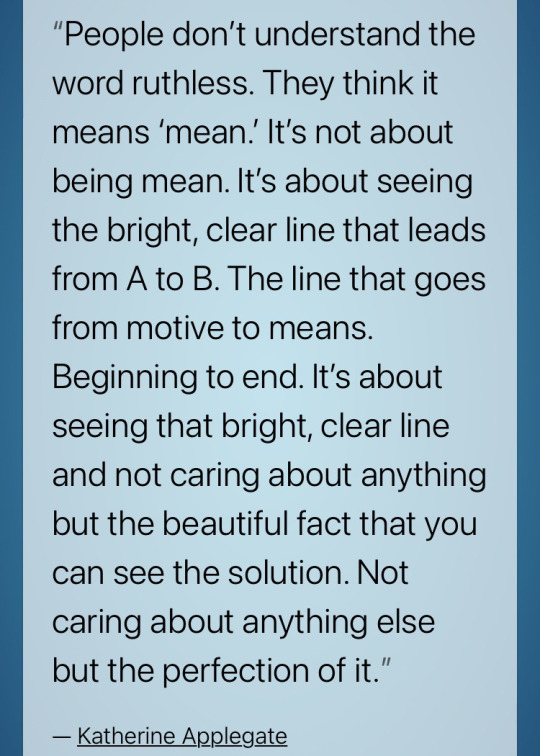
This is about the lengths Marcille using black magic and a dragon corpse to resurrect Falin. This is about the party eating monsters. This is about them hanging that man in chapter 2 so that his body could be found by corpse retrievers.
This is about how others react to this knowledge. Especially, this is about how people react to Laios. Maybe he's just an easy target - he doesn't hide what his party is doing, he isn't ashamed, he doesn't know how to mask - maybe it's that hes the leader, the one who's ordering all this to happen.
We the readers know Laios' true motivations - love and passion - so its funny when people like Kabru assume hes some kind of villain. Laios? That guy?? Of course he isn't a villain, how silly it is to even suggest that he might be!
But like, taking a step back, forgetting that his motivations are sympathetic, it's easy to understand why others might think that he's dangerous. He is dangerous. Not because he's the strong, not because he's smart, but because when he sets his eyes on a goal, he gets it done. No matter what stands in his way.
#i'm on chapter 29btw. if you care.#dungeon meshi#laios touden#dungeon meshi analysis#i'm just saying this is a really good villain origin story#or antihero#laios and marcille have transcended the need for petty things like 'morality' and 'the law'#and we love them because we agree with their motivations.#but if you dont think theyre justified its kind of horrifying to watch
122 notes
·
View notes
Text
Marcille is actually one of the biggest reasons it took so long to pinpoint which Chilchuck was the imposter in today’s episode.
The Senshi and Marcille imposters had their own reasons for being hard to decipher, but that was a joint effort on the party’s part. Chilchuck was the only example where a single member’s bias actually swayed the others so strongly that it made them all doubt themselves.
Ryouko Kui did an excellent job of giving us a rich background on how different races interact, and how they may descriminate against each other. Each of the races in this series struggles with these prejudices. Our main characters are not exempt from this, and we see it clearly in the way the shapeshifter manifested as each party member, showing us how the others percieve them.
Marcille knows Chilchuck well, and cares deeply for him as a friend. But she’s not immune to assumptions and biases that come from her elven background. The Chilchuck imposter we are faced with, when it’s down to two of them left, is Marcille’s memory of Chilchuck, Marcille’s perception of how he behaves.
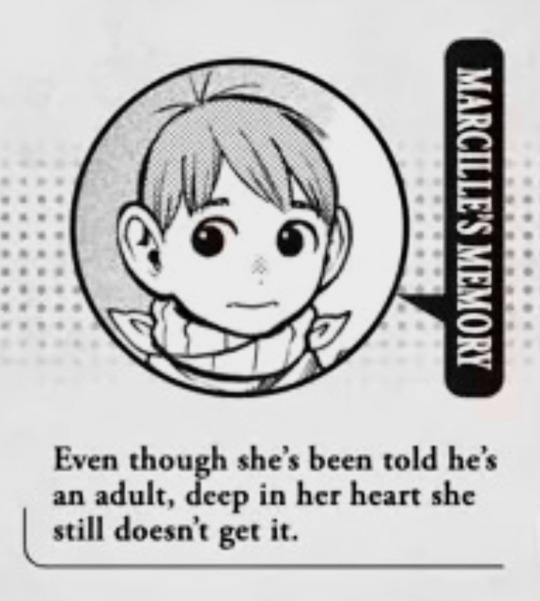
One of the first manifestations of this bias occurs when shapeshifter Chilchuck can’t get a jar open.
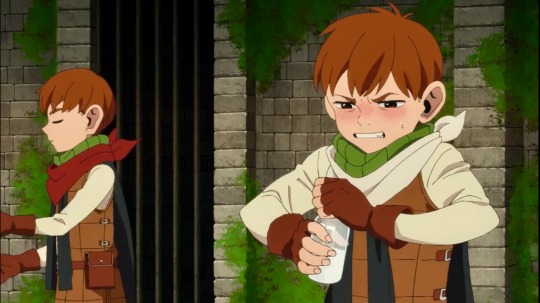
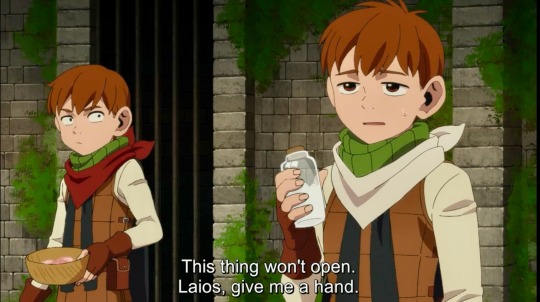
The real Chilchuck knows that this would never happen—at least not in this way. Chilchuck is proud, yes, but he asks for Laios’ help all the time. Laios is actually one of the party members he is the most likely to ask help from, given how long they’ve known each other, and how much mutual trust exists between them.
However, the whole scenario isn’t right. Chilchuck wouldn’t give up so easily on opening something; his whole job is opening and unlocking things. He would never quit an attempt like this within 5 seconds, then run to Laios so that “big strong adult tall-man” can open it for him.
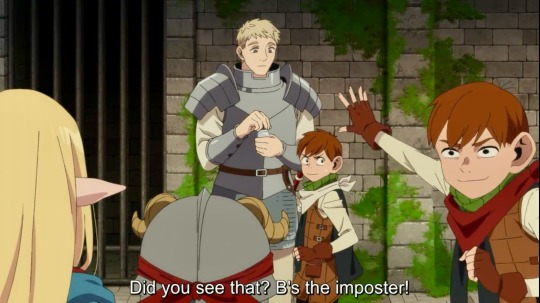
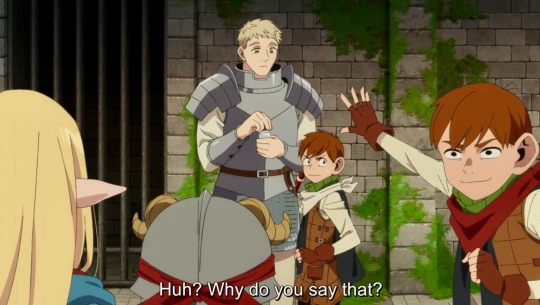
Marcille is the one who asks, “Huh? Why do you say that?” because Marcille is partially right. Chilchuck does rely on Laios, and Marcille knows this to be true. But she fails to realize how he relies on Laios.
Chilchuck respects many of Laios’ talents, but the most important ones are his combat skills, his emotional fortitude, and his quick thinking when delegating tasks. He trusts Laios as someone he is comfortable following (he literally said to him and Shuro in the last episode: “Laios!! Tell us what do!! Give us orders!!” when chimera Falin was quickly overpowering them).
So while Marcille almost understands Chilchuck’s confidence in Laios, she tends to accidentally infantilize him in the process.
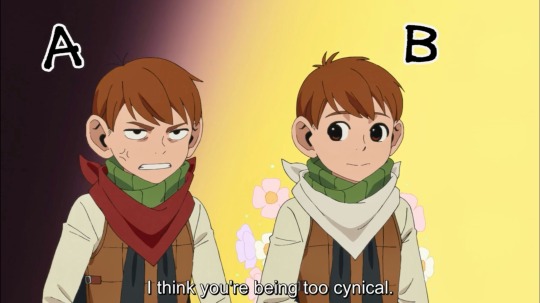
She immediately believes that Chilchuck B (the imposter, who is specifically using her own memory as its base for Chilchuck’s personality) is the real one, and says so, because she’s blinded by her perception of him as being childlike and adorable because of the very common racial prejudices that half-foots deal with all the time.
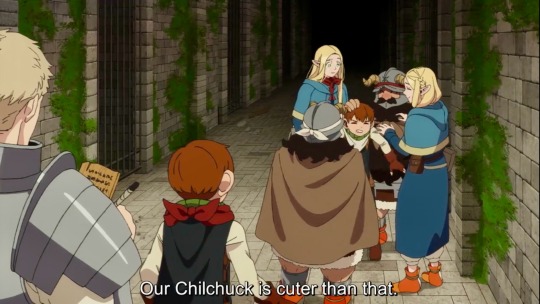
She dotes on the imposter, and is open with her affections, as usual (again, her care for him is clear), but doubles down on that bias, on her own assumptions of Chilchuck’s behavior shown through her own lens.
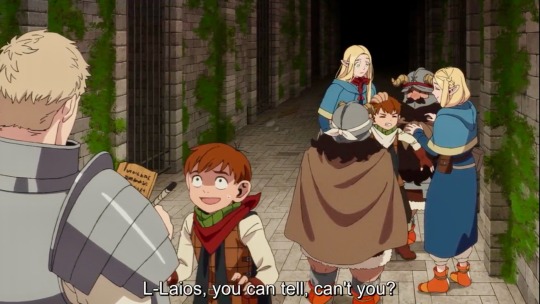
And ultimately, Laios was able to tell the difference, but only because he watched how the Chilchucks handled other minute tasks. Marcille’s stance on which Chilchuck was real truly did throw the others for a loop, at least until the threat passed. And honestly, that’s part of what makes the shapeshifter so terrifying. Its strategy almost worked.
#dungeon meshi#delicious in dungeon#marcille donato#chilchuck tims#laios touden#senshi#senshi of izganda#chilchuck#shapeshifters#laios dungeon meshi#marcille dungeon meshi#dungeon meshi analysis#neo queen serenity’s posts#dungeon meshi spoilers#dunmeshi#dunmeshi chilchuck#chilchuck dungeon meshi#this can be translated in a shippy light tbh#chilaios#does marcille ship them? does she assume chilchuck sees laios as his knight in shining armor? hehe#dungeon meshi episode 18#dungeon meshi anime#dungeon meshi meta
7K notes
·
View notes
Text
I think part of why I am super fixated on Thistle’s age as part of his tragedy is because of the autism.
Thistle was a child when all that went down in Melini which led to the creation of the dungeon and his descent into madness. He was a child and Delgal was an adult when Delgal, terrified by mortality, demanded Thistle make the kingdom live forever and then blamed Thistle for giving the kingdom exactly what it’s king asked for.
Thistle was a child. But he was a child constantly being treated like an adult because his so-called adoptive family didn’t understand that he matured at a different speed than them. Because they adopted and lowkey enslaved a kid from another race and didn’t bother learning about any of the things that made Thistle different from them.
And maybe it was just my experience, but I think a lot of autistic people remember being told how mature they were when they were little kids. Only to have people demand to know why you didn’t understand something they viewed as a basic tenet of adulthood or social life once you’re supposed to be all grown up.
(Obviously there’s also a racial bias at play — it’s not an accident that Thistle is one of relatively few dark-skinned characters in the show while the Melini royals are white. But I don’t feel as though I can speak authoritatively on that, especially since the autism is something I’m more familiar with.)
Thistle was a child when Delgal demanded immortality and a the Golden Lion offered it. And because he didn’t age or mature, he functionally stayed a child for the thousand years the dungeon existed. But he’s treated like an adult who holds the sole blame and culpability for his actions, despite how many people who were of far greater privilege and maturity pushed him to that point.
#I don’t think Delgal is a VILLAIN per se#but he certainly has shit to answer for#he drove Thistle to where he was in canon but seemingly never admitted it#Yaad doesn’t know that his grandfather ASKED for immortality#and if the rest of the Melini royal family didn’t know#then Delgal certainly didn’t admit the truth to anyone else either#dungeon meshi thistle#thistle dungeon meshi#delgal#dungeon meshi#autism#dungeon meshi analysis#max.txt
44 notes
·
View notes
Text
what people often dismiss about kabru's characterization is that he was a spoiled kid for a big portion of his life. it's not that he just can't bring himself to clean his room, he actually has no idea how to do chores. refuses to learn even. his friends even make fun of him because of it, when they aren't concerned about his health. the funny thing about "grilled mushroom" is that he has no idea how to cook, not just monsters, just in general.
he's a typical idealist in a materialistic story and it's interesting that kui didn't really subvert that trope at all, it plays out in a very straightforward fashion. he spent a lot of time living noble life, not concerning himself with material, because it was others who took care of that. he keeps living with this mindset, only concerning himself with big ideas, even if it something that damages his health.
in the point of view of the story it's a character flaw, something he needs to overcome in order to truly understand how the world works. so of course he has to confront the reality of his body and the value of material world as part of his character's arc, that's just how it usually works in the stories like this.
488 notes
·
View notes
Text
World Map Notes: the Elven Northern & Southern Central Continents
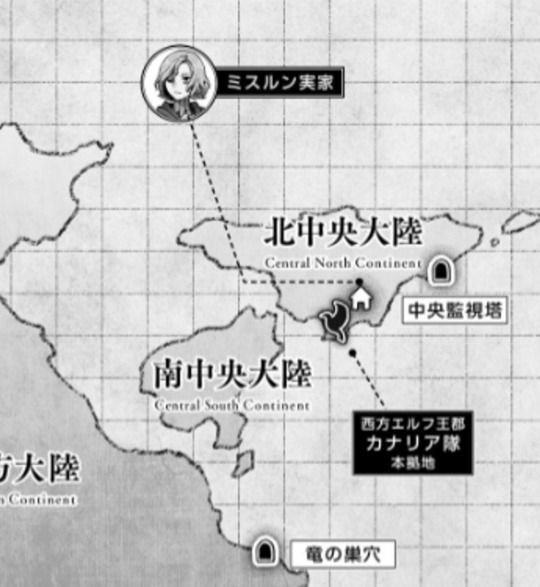
These nations are where all the elves in the story except Marcille and Thistle are from. This post collects all the information I could find about these two nations, and included a bit of analysis based on that information.
TL;DR (includes both fact and my speculation):
The Northern Central Continent is a feudal monarchy with a strong class system, as well as strict borders, & could probably be considered an ethnostate. It's deeply hierarchical, and the queen is a traditionalist - so it's probably very structurally biased against non-elves and half-elves.
Elves in the NCC practice cannibalism in some rural areas!
The Southern Central Continent is more diverse, with a large tallman population on its South Coast.
To elves, "Court Magicians" exclusively refer to those serving the elven queen - a prestigious role that seems likely to be only open to nobles.
The SCC may not be a monarchy, though it's not clear what kind of leadership or societal structure it does have.
The NCC will habitually take anyone involved in ancient magic as a criminal to prosecute on their terms, regardless of jurisdiction, but this depends on their political influence and ability to pressure local leaders to agree to extradite the criminal.
Elves VS Dwarves and Gnomes may have been at war around the time of the Golden Kingdom being sealed. This conflict also may be one of the factors pushing the kingdom to be sealed in the first place.
The "Central Region" might be the origin of the "Common Tongue" that our characters speak.
Northern Central Continent
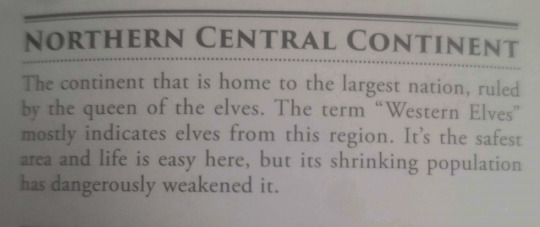
The Adventurer's Bible | p. 132
For this place to have a high quality of life, and also a declining population - especially when it's so close to the Western Continent, which is stated to have poor quality of life - there must be strictly maintained borders and a strong anti-immigration policy. Based on the attitude of the elves, I wouldn't be surprised if it was very difficult to move there unless you are also an elf.
It could probably be considered an ethnostate - and while in these kinds of fantasy worlds, that's pretty common. Take Rivendell, or Moria, in LOTR - they take for granted that these kinds of different fantasy races will live in separate communities.
But that isn't actually realistic, and I think Kui has considered it as more of a politically established status quo rather than an obvious natural result of having magically distinct "races". Which, even in Dunmeshi, I think is a difficult and not-terribly-accurate way to represent politics - racism does not emerge from actual, physical differences between races, after all.
But Dunmeshi's presentation of this idea is interesting, because of the recognition that if there is an "elven nation" which prioritises the interests and rights of elves over other races, that is because there's a deliberate, concerted effort to keep it that way.
But there's a small section of the NCC with a high tallman population - I wonder what kind of community they have, and how they fit into the strict elven hierarchy?
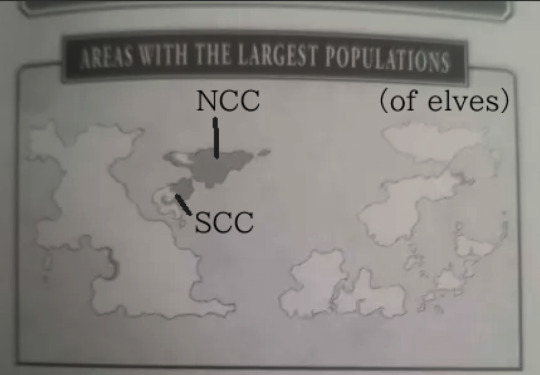

The Adventurer's Bible | pp. 134 & 136
Kabru and Rin, and other kids like them, who are adopted or taken as adopted children(rarely - the way Milsiril treats Kabru is not perfect, but she's deliberately attempting to be better than other elves.... meaning other elves are usually worse)/pets/objects by elven nobles, as well as accomplished or notable individuals who earn the elves' favour/are "invited" to stay (such as they try with Laios at the end of the story) would be an exception.
Other long-lived races could probably (...?) visit, but given the historical conflict between elves, dwarves, and gnomes, I think they'd also be pretty hostile to many of them coming to live on the NCC, even if they see them as more like equals.
Social Structure & Nobility
The Northern Central Continent is an absolute monarchy under a 372 year old queen, Heimeya (IDK what the official romanisation of her name will be).
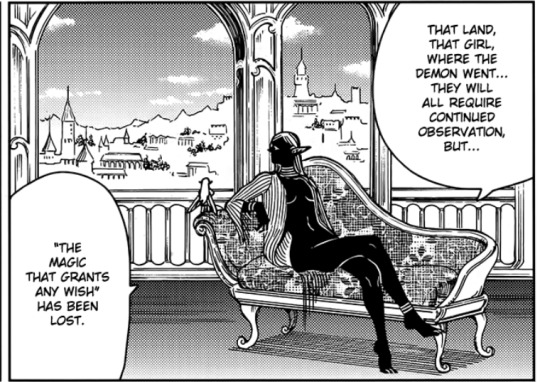
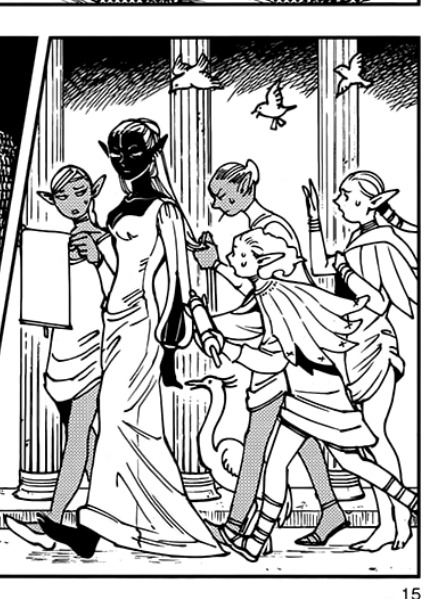
...With extended "nobility", which are the group that the canaries' guards draw from. We don't get much clarification of what sort of structure their nobility has, what titles there are, and where our characters who are nobles fall into it.
Pattadol (House of Vari), Mithrun (House of Kerensil), and Milsiril (House of Tol) are nobles.
Mithrun's noble house, Kerensil, is apparently a well-known family of investors! I wonder what sorts of businesses they invest in & what the elven economy is like?
Milsiril's house, on the other hand, is a well-known military family. I wonder if Kabru could claim the surname "of the House of Tol". He did go to family gatherings after all. But if he was comfortable doing so and it would be accepted, I would assume he'd have done so when introducing himself to the canaries.
Flamela is a distant relative of the queen, who has additional status due to exhibiting the genetic trait associated with their queens, extremely dark skin.
The queen is a "staunch traditionalist" who wouldn't even acknowledge a half-elf like Marcille. Nice! I really feel bad for Kabru and Rin growing up as tallmen in this sort of culture.
Court Magicians
While generally this is a term for any magic user who serves in a royal court, in the Northern Central Continent it seems to carry a lot of esteem; even just as the daughter of one, Pattadol assumes Marcille has the right to boss her around and to handle highly secret, highly illegal ancient magic secrets.
That makes sense, as in the society of the Northern Central Continent, you'd be directly serving the elven queen. But also, she has enough Court Magicians that Pattadol would not expect to know Marcille's mother's name, but few enough that it would be a big deal and Cithis would know about it if one had a half-elf child.
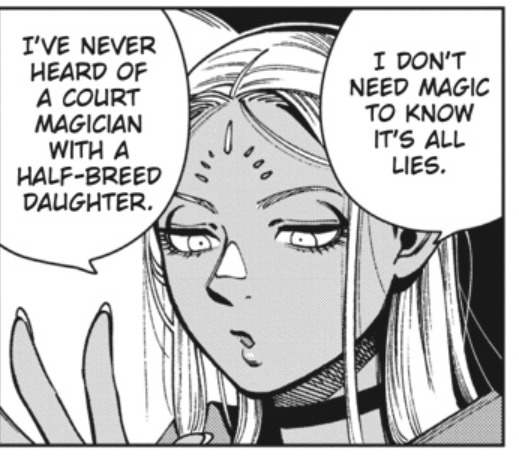
I don't think it's remotely unlikely based on that to assume that this role is only available to nobles.
A "Court Magician" who doesn't serve the NCC Queen isn't a "real" Court Magician in the eyes of NCC elves. Those short-lived monarchs would be happy just to have an elf around regardless of whether they were actually any good at magic.... according to Cithis.
Magic seems very important to the society of the NCC elves. The queen communicates with her subordinates via familar, and the birds we see surrounding her seem like they are some kind of magic - perhaps not familiars since we see her familiar, but some other kind of scrying?
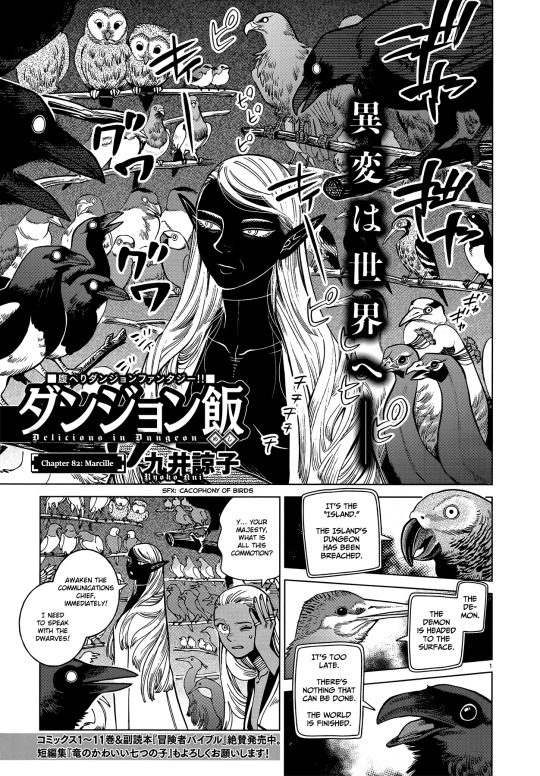
Also, based on the fact Pattadol assumes a Court Magician would be serving the Queen of the NCC, we can theorise that perhaps whatever structure the SCC has, it isn't a monarchy....? Heimeya is "the queen of the elves", after all - that doesn't sound like there's another elven monarch competing for the title just next door.
Ordinary People
Apparently the NCC is a safe place and life is easy -- but given the strict class system, I kind of expect that varies a lot depending on the family you're born into.
The only elves we meet who are not nobles are the convicted criminal canaries, so it's hard to get a sense of what life is like for them from that. Cithis was apparently a wealthy fortune teller with "an intense jealousy for those born noble or wealthy." So I assume she was not born into comfort.
Apparently "There are also primitive villages deep in the woods and underground, and in some regions cannibalism is still practiced." Which is awesome. Based on her videogame elves art I think Kui's probably making a little nod to Divinity: Original Sin elves, who can absorb memories through eating the flesh of others. Elves in dungeon meshi don't have this trait, but I wonder if there is a magical ritual or some kind of cultural practice with a similar intention.
Cuisine
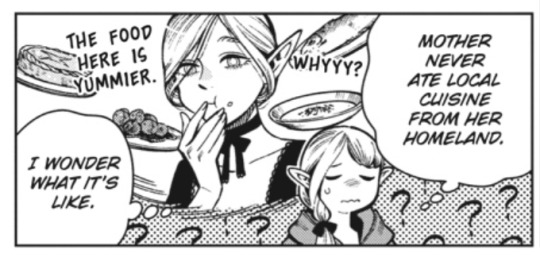
Marcille's mother didn't think much of the elven cuisine.
Liricmumwarel is fancy candy given out by the elven queen the shape of which conveys blessings.
Elf Cake is a crumbly dry cake that Kabru and Thistle don't think much of. I've heard someone discuss what it's likely to be made of, but I am afraid I don't recall.
Southern Central Continent
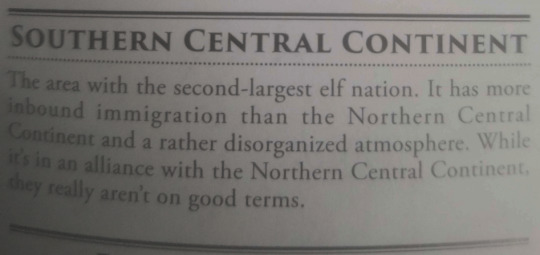
The Adventurer's Bible | p. 132
It seems like the Southern Central Continent gets a lot more immigration and has a more diverse population, especially along the south coast (near the Western Continent). That south coast has a high tallman population.
Fleki and Lycion are from the Southern Central Continent. Fleki got into ancient magic for the money, so you can assume there's probably class disparity there too; things are noted by Kui to be more "disorganised" than the NCC. Not a bad thing at all - the NCC is definitely too "organised" in my books. But that does potentially also mean there's less, e.g., bureaucracy, central organisation, less of a social safety net. But then again, in the NCC I doubt that whatever "safety net" there is, is available to everyone.
We can't extrapolate much from Fleki & Lycion's personalities, because they clearly aren't in the most stable societal position, and I get the sense that they're the countercultural type - they probably don't represent the type of person typical to the SCC. Also, our NCC characters are all either nobles or used to navigating high society (Cithis, Kabru to an extent) so they aren't exactly a typical "ordinary NCC person" as a basis for comparison either. However, there's less of a "strict set of social rules" type of feel to the SCC characters, fitting with my suggestion that the SCC may not be a society with a strong feudal element.
Geopolitics & Conflict
The fact that, despite their being from the SCC, Fleki and Lycion are in the Canaries, who work directly under the NCC's Queen, implies that the the NCC feel entitled to process and prosecute people who commit ancient magic-related crimes regardless of any notion of "jurisdiction". This is backed up by the way that they were going to take Marcille - but that is something that the governor of the Island had to give permission for, which Laios is able to withdraw. So I assume that the NCC elves apply pressure on various world leaders to extradite criminals involved in ancient magic.
The SCC would cooperate with this, since they're allies, even if they don't have a great relationship (according to the World Guide).
The NCC are also clearly able to take half-foots without trouble, as we see by Chilchuck saying he's known half-foots who got involved with "black magic" (ancient magic) and were disappeared by the elves. But I doubt gnomes or dwarves are giving people up easily - though that probably doesn't go for dwarves like Senshi and Namari, without strong community ties.
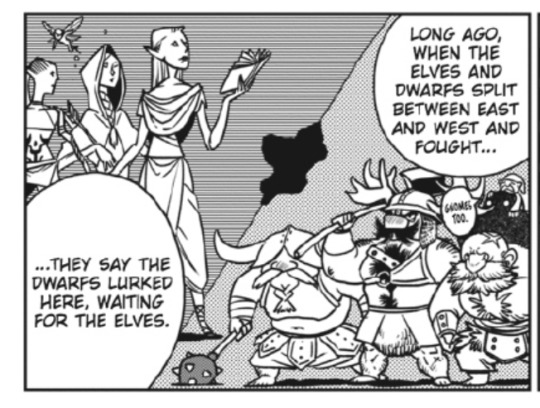
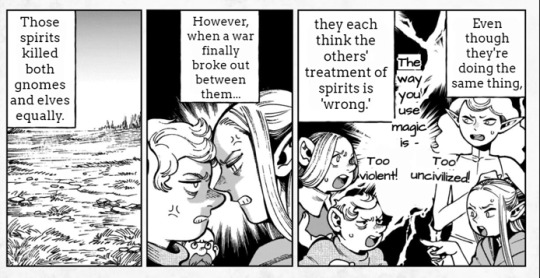
Long before the current times, elves fought dwarves & gnomes. There might have been more than one of these conflicts...? While long ago, this war isn't "ancient" (like the ancients who sealed the demon into dungeons, before their world was mostly destroyed by it).
Thistle, Delgal, and the Golden Kingdom were (I believe) caught up in one of these conflicts, which used Melini as a staging ground - thus why Thistle was pushed to seal the entire kingdom in the dungeon.
To do this, Thistle unseals a dungeon created by the "ancient people". These could be the "ancients" who created the dungeons, before the apocalypse. Or they could be another, still extinct, society.
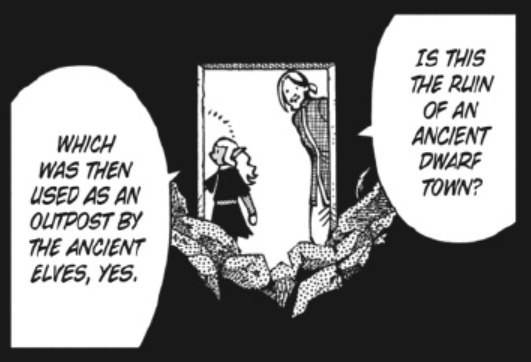
Regardless, at least one of these conflicts seems to have taken place after the golden kingdom was sealed - so, within the last 1000 years.
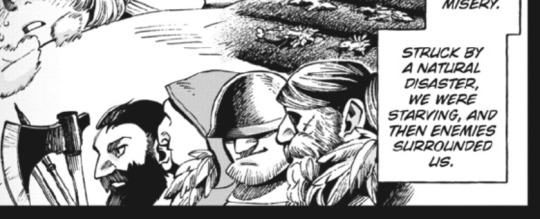
Though, this could refer to a different, more localised conflict between the Golden Kingdom and their dwarven neighbours.
The order of events is that the Golden Kingdom was sealed (1000 years ago or so) > Dwarves took over > Elves stole the land from the Dwarves ("long ago" by the Island Lord, a tallman's, standards) > Elves gave the land to a local lord, who was either an ancestor of the Island Lord, or the Island Lord himself. The Island Lord is himself a descendant of the lord who poisoned Delgal's father, as is noted in the World Guide. However, it isn't impossible for there to be large gaps of time between these events, which could put the elf / dwarf wars at a more recent date.
The fact we know that the elves stole the land from the dwarves, and then granted it to a political actor who was relevant during the events of the Golden Kingdom flashbacks we see suggests to me that the events were roughly contemporaneous. If they were, that puts at least one of these conflicts at roughly 1000 years ago.
So, the elf/dwarf & gnome conflict is "long ago" by short-lived standards, but would be considered "modern" by the long-lived races, if you ask me. At least, the equivalent of the World Wars for us - recent history, even if we weren't alive.
I'm guessing the "Elf King" from the below panel in fact was a word that's more gender-neutral in Japanese, since the "Western Elves" definitely have a queen.
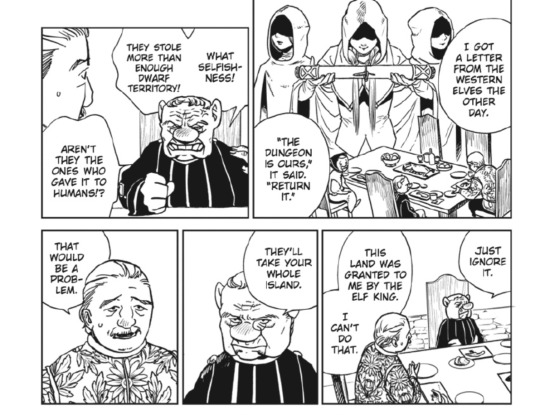
Language
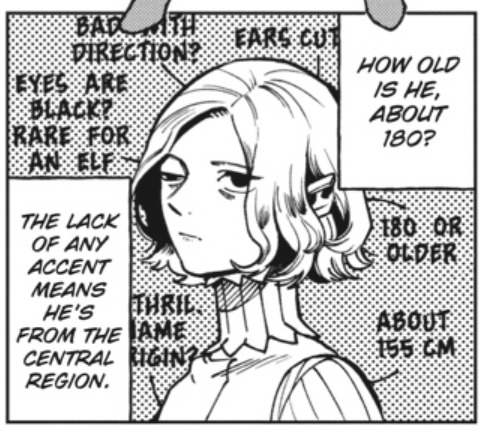
When Kabru says the "Central region" I expect he means the region where the NCC and SCC is.
The fact that he observes that the lack of any accent means he's from the Central Region is really interesting. It could mean two things;
either they switched to speaking in the language spoken on those continents, which Kabru would naturally know, having grown up there. It's 100 percent possible, but I think this would be noted in the story.
or, the language that gets called "the common tongue", the one that all our principle characters speak for most of the story, originated from the elves in the Central Continent. Or at least it's the same one that the elves use, and their political influence is great enough that their accent gets to be considered not an accent at all. The fact they were "granting" land in this area to tall-man lords suggests a large enough historical influence in the area that this is quite plausible to me.
Mithrun absolutely does have an accent - nobody speaks without an accent. His accent is just politically and socioculturally normalised to the point of being considered the "default/proper" way to speak - like received pronounciation in English.
The common tongue isn't ubiquitous everywhere - not just Kuro, but Kiki and Kaka are also noted to be studying the common tongue. The Tansus were born on the Eastern Continent, so probably gnome communities there speak their own language - Kiki and Kaka grew up primarily surrounded by gnomes after all.
It's also quite likely that Kabru, specifically, because of where he grew up, would consider Mithrun's way of talking to be the default "not an accent" accent. His adoptive mother surely has the same upper-class NCC accent. I expect that other characters might experience it as more "marked".
This isn't a world where everyone speaks the same language everywhere; the common tongue is called that, but there are many different languages. Kabru and Chilchuck are two characters who are adept with many of them - Kabru speaks the language of the kobold, and probably lots more. Chilchuck works as an interpreter as part of his union stuff - I can tell you from experience that that's a hugely valuable skillset in that context, as many of the people who most need union representation are people who don't speak the dominant language, or at least not fluently.
If you got all the way to the end of this post.... thank you for reading, I love you. Check out my other World Map Notes under that tag on my blog; I've made a few so far and there will almost certainly be more. Next I'm thinking the dwarven nations...? But I could be persuaded if someone had a preference.
Also, anyone got any speculation on what, exactly, is the previous time that Heimeya ate a person/monster/chimera that this panel implies:

We really don't have anything to go on whatsoever, but I think it's a fun tidbit.
#og post#dungeon meshi manga spoilers#dungeon meshi meta#dunmeshi#dungeon meshi analysis#delicious in dungeon spoilers#dunmeshi spoilers#delicious in dungeon#dunmeshi meta#the canaries#milsiril#mithrun#kabru of utaya#i feel sooooooo sane to have made this. but it has some super interesting details imo#colour coding only on the TLDR just cause I dont want ppl to take my theories as fact#character info I drop without a panel comes from the world bible#world map notes
375 notes
·
View notes
Text
Toshiro defense post
Hi everyone! So, I know this topic has been discussed a bunch of times before xd, but I keep seeing people say nonsense about Toshiro so… strap in cause this is another Toshiro explanation post!!
IMPORTANT: I do want to clarify that it’s fine if you dislike Toshiro. After all, everyone has the right to dislike characters so I’m not going to stop you, I know it’s not that serious. But then I’d like to ask you to stop spreading misinformation about him, use him for angst stuff that mischaracterizes him or any of that xd. Like, dislike him in peace xd but stop using him as a villain. Also, before any of you say “I understand his complexities but…” let me stop you bc most of the time you don’t xd. Like you acknowledge the microaggressions and other things but use other poor excuses for hating him or invalidate that, so please read this post and keep an open mind!! Finaly, this post is going to touch on and disprove the following topics: 1. Toshiro hates Laois (together with stuff like how he is ableist and an asshole) 2. Toshiro is a huge hypocrite for liking Fallin (together with how he doesn’t really love her) and 3. Toshiro was racist towards itsutzumi (without getting too into complex race politics). I will also back up my arguments by content in the anime and some of the extras from the manga, despite that I will not delve on spoiler related content so, let’s get to it!
1. Toshiro hates Laios.
Something that people use to hate on Toshiro is his famous fighting scene with Laois, saying things like “Toshiro was ableist towards Laois” “Toshiro is a hypocrite because he complains about poor communication, but why didn’t he say anything himself?” “Toshiro hates Laois” but before we tackle this let’s recap:
In this scene they fight over the fact that Laois has poor social skills and doesn’t understand the ways Toshiro expresses his annoyance at him and his desire to have some space, he also accuses Laois of being unserious about saving Fallin and even says that he has always hated Laois. This scene resonated with MANY people that have experienced this exact same conversation with “friends” who would get mad at them for showing neurodivergent traits, I am one of those people as well so I can totally understand. So, them seeing themselves in Laois and their acquaintance in Toshiro people accuse him of being ableist, but this:
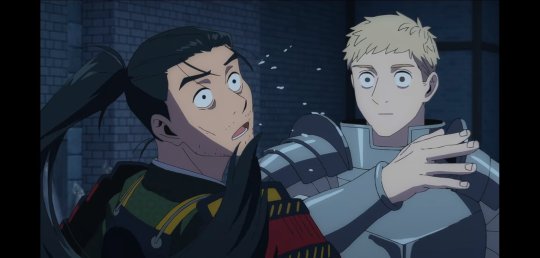
Is not that. First of all, it’s important to note that Toshiro’s complaints come from his cultural background as an easterner, where he is used to subtle communication, and by his upbringing as an heir of his island (something that is explained by this thread in great detail!! But to summarize it basically says that he has become more reserved due to his retainer’s overbearing nature and do to being compared to his father constantly and by being surrounded by rumors of his family, so he chooses to not speak out as to cause more trouble for himself). Second of all he doesn’t really do anything ableist… many people say that they hate him “because he was a huge dick to Laois” but apart from expressing his frustration by yelling and fighting, something rude of course, what ableist or horrid thing did he do? He didn’t call him names or anything, and even acknowledges the fact that Laois is someone who acts in good fate and doesn’t mean any harm to him, but he still dislikes his actions (not a bad thing at all). It’s also important to note that Toshiro is TIRED in this scene, he hasn’t eaten or slept in 3 whole days and suddenly he bumps into a bunch of problems and the girl he loves turned into a monster by this guy who seems WAY to relaxed about it and who he already has gripes against, my question is: Who wouldn’t lash out? Additionally, this scene is important for him too!! As he finally stands up for himself and expresses his feelings, something that drives his character development into being a better guy.
On top of all that, it’s also important to note that Toshiro himself shows signs of being neurodivergent just that in a different way than Laois. For example, his hyperfocus on saving Fallin making him ignore his needs, his overreliance on social cues to understand others, his stand offish an awkward nature that doesn’t let him connect with the people around him and his difficulty to express his needs. These are things many neurodivergent people can relate to, and dare I say, things Laois shares with him!! They both suck socially which is literally what causes this, so what makes him so different? So hard to forgive? What makes it hard to understand him but not Laois? And let’s all not forget the fact that Laois has been pulling a microaggression on him by calling him a butchered version of his name this entire time! It doesn’t make him evil! But it shows how they have a complex relationship where both sides where right. (Also, I know this is a complicated topic and I know there are poc people who hate him BUT, to me the issue is that he 1. Has a meltdown and 2. He’s not white. Like it is very known and said that poc cannot express themselves in such freeing ways as our white counterparts, so it’s harder to be nd and poc than white and nd, which is somehow the case for Toshiro as well xd. Many people say that he shows how people only like nd traits when they’re palatable, but this argument goes back to you, you might find nd traits better when it’s on a white guy you can baby and not on the Asian guy who should know better. None of them should have to, characters are allowed to do bad things and fix those errors).
Lastly, Toshiro mends his mistake immediately!! He doesn’t hate Laois, if anything he holds complicated feelings towards him for a while, which most of the cast do (more on this later). Some people seriously act like this didn’t happen, but at the end of the fight he admits that he doesn’t hate Laois (media literacy check but not everything a character says while angry is true!!) but envies his free spirited and straight forward nature. And if this doesn’t seem enough to mend his mistake, he gives Laois the calling bell, which will immediately send someone to help him and fetch him to the east. Would you have a guy that you HATE as a refugee in your country? Plus, he’s serious about the bell too! This scene wasn’t added in the anime, but there’s a point where Toshiro and Kabru are leaving and they keep hearing the bell, which they point out as annoying, despite that Toshiro always keeps it with him and says that if the noise stops, he will know to fetch Laios. If he really hated him, why would he keep a loud object around him just to make sure he is safe? (There’s literally a scene where it goes off after Laois throws it and he just acts embarrassed that it’s interrupting a conversation, but he doesn’t leave it or anything).
2. Toshiro is a huge hypocrite for liking Fallin.
With that point out of the way, lets get to the 2nd problem: Toshiro’s crush on Fallin. Let me preface once more by saying I LOVE Farcille and think they’re a very cute ship, but using Toshiro as your angst bait is not cool and super ooc (clarification: I don’t mean like a respectful joke about him getting rejected or exploring marcille’s thoughts on his proposal, I mean bashing on him hard or saying that he would intervene or disapprove of a farcille relationship).
Ok so in this case, many people say that Toshiro is a HUGE hypocrite because of 2 things: 1. He likes Fallin but dislikes Laois even though they’re almost identical, and 2. Because he claims to love Fallin while abandoning her and condemning black magic.
So, let’s get into why this is not true:
We have already discussed how Toshiro does not dislike Laois, but pushing that out of the way, the one thing he “dislikes” about Laois is the one thing he does not share with Fallin, which is their social awareness. Fallin is significantly more socially aware and tends to do things as to avoid burdening others, putting her needs aside, she’s someone who is very thoughtful and mindful of the people around her, unlike Laois who, while also thoughtful and kind, is not as receptive (Also crazy to note that her and Toshiro share this “not fully sharing my feelings as to not burden others” thing). Besides that, he likes that Fallin likes bugs/nature (the same thread from before has a nice possible explanation if you want to check it out) something that could be related to Laois’s love for monsters which, fun fact, he doesn’t hate at all!! Something that, funnily enough, others seem to give Laois flack over but not Fallin (crazy how there aren’t as many people shitting on Marcille or chilchuck for this?? specially since Fallin also likes monsters but Marcille never says anything about it and centers her annoyance on Laois? Wow… (I don’t hate Marcille for this either btw, I’m being sarcastic). And on the topic of this double standard, I’ve seen many people ask how he thinks he can marry into the Toudens while hating Laois (bad), while at the same time seeing so many “omg marcille thinks the only downside to marrying Fallin is Laois” (funny), crazy how its bad when Toshiro does it, huh? (Even crazier is the fact it’s only half true for both of them xd, they like Laois he is their friend)
So, once more he dislikes that Laois doesn’t give him space but likes Fallin because she does, especially because they aren’t very close at all. Toshiro has a hard time getting close to others and it’s stated that he tends to put barriers around himself with people who are “close” to him like maizaru and Hien. But since Fallin is an acquaintance at best it’s easy to like her from afar and the traits she seems to show outwardly.
Which leads me to the next point: Toshiro mani pixie dream girlifies Fallin. It is true that Toshiro has idealized her and doesn’t know her too well because they don’t talk but... is that a crime? There are many characters who hold biased opinions on others (like kabru with Laois or senshi with marcille or marcille with the orcs, etc.) and that doesn’t really get critiqued either. I don’t think it’s the sign of a horrid man for him to like Fallin without knowing her to well xd, it’s pretty normal for a crush and also if you consider his nature. Besides, this is once more influenced by his background: in one scene chilchuck mentions how the proposal thing is common in the east + he is an heir xd, so it’s only logical to be thinking about marriage, specially since his dad has high expectations for him (something that I know has not yet been shown in the anime, but it is present on extra manga content). It’s important to note also, that he doesn’t claim that he knows her best, puts words on her mouth or push his feelings towards her either. He proposes, she says that she will think about it and as far as the anime is concerned, he waits patiently for her answer. He doesn’t say “curse you woman you are coming with me!” or anything like that, and even if he expresses that he wants to leave with her to the east, that is ONLY if she says yes and agrees to that, so its illogical to say any of these things without proof.
Now onto the 2nd main point of this section: He abandoned Fallin and hates black magic. 1st of all, he didn’t abandon Fallin, he left to gather his retainers to search for her in a way he thought more efficient and once we see him again, he HASN’T EATEN OR SLEPT IN 3 DAYS OUT OF DEDICATION ALONE!! (If you use the argument that he abandoned Laois, that can also be explained by this). Now, him hating dark magic and claiming to turn in Marcille to the elves. This is not the best, since it poses conflict for our protagonists but 1. He doesn’t even end up doing that and helps them out after all is explained and 2. Put yourself in his shoes, what would you do if your crush turned into a monster that killed all your party? “Toshiro didn’t love Fallin enough to accept her as a monster unlike Marcille” Are you guys listening to yourselves? What he sees is a Fallin that has been desecrated and turned into a monster, something that will harm her and others + he’s not a magic specialist so how would he know or believe that they could turn her back to normal? He condemns Marcille but not out of lack of love, but I would say because of it, as far as he knows this could only turn worse for her anyways. Also, Kabru points out his illogical line of thought, claiming that it would be better for Fallin to die then, and Toshiro realizes how stupid he sounded a moment ago xd; Kabru points out how he also would have done anything to save her, and he backs down in agreement.
Once more, maybe annoying but not bad guy material. What’s more, this one is a really pressing matter as I have seen SO many Farcille fan artists and editors using him as an easy villain that hates Marcille (he is canonically scared of her) or as a cuck that doesn’t get Fallin. Somone pointed out once how he gets treated like a female character that gets in the way of an mlm ship and I agree. But while sometimes funny, it gets absurd at times and tends to border on making him someone he is not. I’ve even seen people say he’s homophobic (XD) or make him the token straight guy (something that in most fandoms means being an annoying incel character). In addition, many people say that Fallin would hate him for being “mean” to Laois but 1. She is very kind and would probably understand him. 2. If she realizes Laois has forgiven him, I don’t think she would meddle in to fix her brother’s problems because he wouldn’t want that and that’s just not her personality.
2.5 Small section.
Before we move into the last section, I’d like to add a small section called: you guys don’t understand Toshiro’s personality. Let’s be clear Toshiro is a shy, quiet, reserved, sentimental, rigid and half-hearted guy. It’s not common for him to start things, he tends to leave problem solving to authorities, he isn’t too confident in himself, and he is also an outcast in his homeland. Yet so many people describe him as being arrogant of self-absorbed and I really don’t know where that is coming from. Like, I’ve seen a bunch of people say, “oh how can he think he’s good enough for Fallin?” or variations of the sort but... I don’t think he thinks that he just decides to shoot his shot anyways. I’ve also seen some people describe him as some “pretentious rich asshole”, but this is also never showed or implied in text. Toshiro does not flaunt his wealth; he doesn’t act like he is better than ANYONE in the party, he just has money by being an heir (something not fun for him) and that’s it, but he doesn’t even use his status to get anything from anyone either., so… where is this coming from? (Racism? a need for a bad guy? who knows?) Plus, many people seem to dislike him because he is an aristocrat but… the system is not the same as being like a prince, his family just has influence in the east. Besides, characters like Laois or Mithun were also well off and from influential families and don’t get that type of flack. There’re also characters like Laois and Kabru, who express the desire to join this “aristocratic/monarchy” system by becoming king and lord of the dungeon. Who, then again, don’t get that flack.
3. Toshiro was racist towards itsutzumi.
With that out of the way, we have reached the final point: Toshiro owns people (making him racist ig). Ok so let’s preface by saying 2 things: 1. Dungeon meshi is not a racist story, but a story with racism and many complicated race relations that get treated respectfully for the most part. With this is included, the complex treatment of beast skins and other races seen as less human like kobolds or ogres like Tade. 2. The retainers are not slaves; they are servants for Toshiro’s family.
Ok, so it is true that Toshiro’s father bought itsutzumi from people who were abusing her (and Tade as well but people don’t bring her up when talking about this xd) and later put her to work as a retainer, so therefore he owns her right? Yeah, but not as a slave. Slaves do forced labor and are kept in inhumane conditions, which she is not, as she is given a home, education and the most labor she does is chores (which she usually avoids anyways) and probably some fighting of the sort. In fact, you could even say that she was enslaved prior to being bought by Toshiro’s father (not that this is an excuse for buying her necessarily, but once more this relates to complicated race things). It is also important to acknowledge that as a beast skin itsutzumi (a non-human) is seen as less valuable and gets treated unfairly by maizuru. And while it can border on othering behavior, like being tied up for misbehaving, this is once more pushed by maizuru and not any of the other retainers or Toshiro himself. With this argument usually comes the mention of the cursed collar that was kept on her, which is definitely a bad thing, but once more it is made by maizuru without Toshiro having ANY knowledge about it. I don’t judge any anime only for not knowing this, but in one extra it is revealed that Maizuru actually used the collar on Toshiro himself as a child, so that he would not leave too far from her side, so she explains that she made a similar one for itsutzumi; in this extra he looks surprised and remembers the traumatizing experience so... yeah, he didn’t know.
Additionally, many people compare the argument that he doesn’t own them, but his father does with the sixpence drama from a long time ago. Saying that this doesn’t excuse the behavior and that he should have done something, but that can also be explained. 1. Toshiro actually doesn’t meaningfully associate with any of the retainers prior to leaving to the island, (as explained by the adventurer’s bible and other extras) except for Hien as they are childhood friends and Maizuru. Besides that, he holds no relation to any of them, so he could not have known about itsutzumi’s situation, and it’s even shown that he doesn’t know how he should treat her at all. Despite that Toshiro does show consciousness towards their situation, saying that he would like to talk to Tade about being so adoring of him and his father, but he isn’t sure how to approach the issue. With that, we could assume the same could be said about his feelings towards itsutzumi. 2. “He left her to die”, technically no. They know she’s a capable fighter, so they probably didn’t see any problems with leaving her and also, itsutzumi scapes his party. Meaning that they know she doesn’t like them so why would they go back and search for her? If anything, Toshiro might have thought of it as an easy way to give her freedom, once more, why would you force someone back when you know they don’t want to be there?
“Why didn’t he let her go sooner?” This is explained by the first bit that he didn’t really know her and by asecond thing: contrary to popular belief, Toshiro doesn’t have such a big control of the retainers as it may seem, and it is ultimately maizurus or his father’s choice as to what to do with them. Like he didn’t want them to come with him to the island, but they don’t heed to that and come anyways. So, what makes anyone think that he could just change his fathers wishes? So yeah, he doesn’t own people they work for his family and that’s it.
So, this is the end of the post, if you read all of this, I greatly thank you and I hope I could make at least one of you change your mind. If not, oh well. Once more is valid to dislike characters, you can keep doing that but stop seriously stop with the angst bait or misinformation spread. That is all I want to say, so thank you again and see you later.
#dungeon meshi#toshiro nakamoto#shuro dungeon meshi#shuro dunmeshi#toshiro dungeon meshi#toshiro dunmeshi#delicious in dungeon#dungeon meshi analysis#sorry it's so long xd#also if anyone wants to add anything or has any questions please do so
51 notes
·
View notes